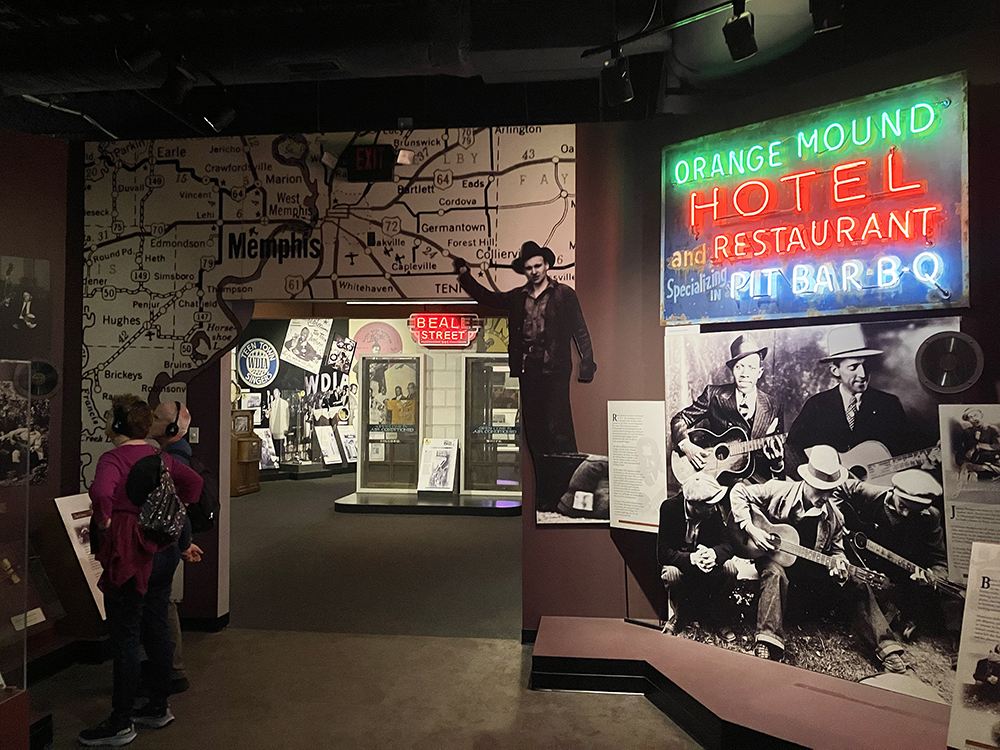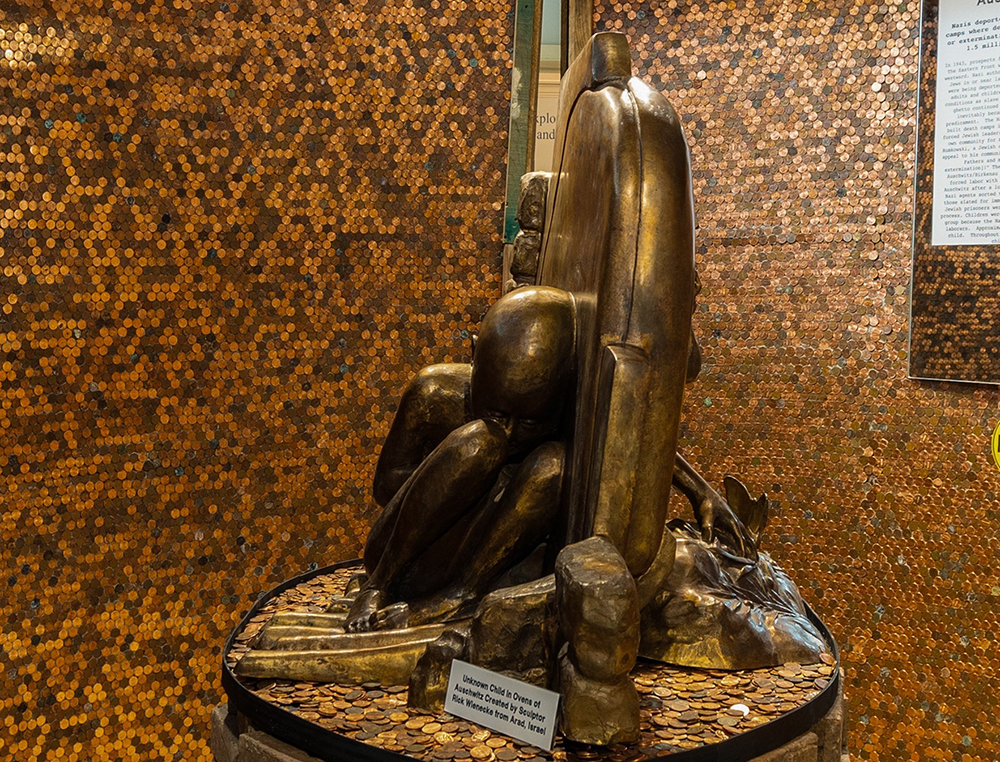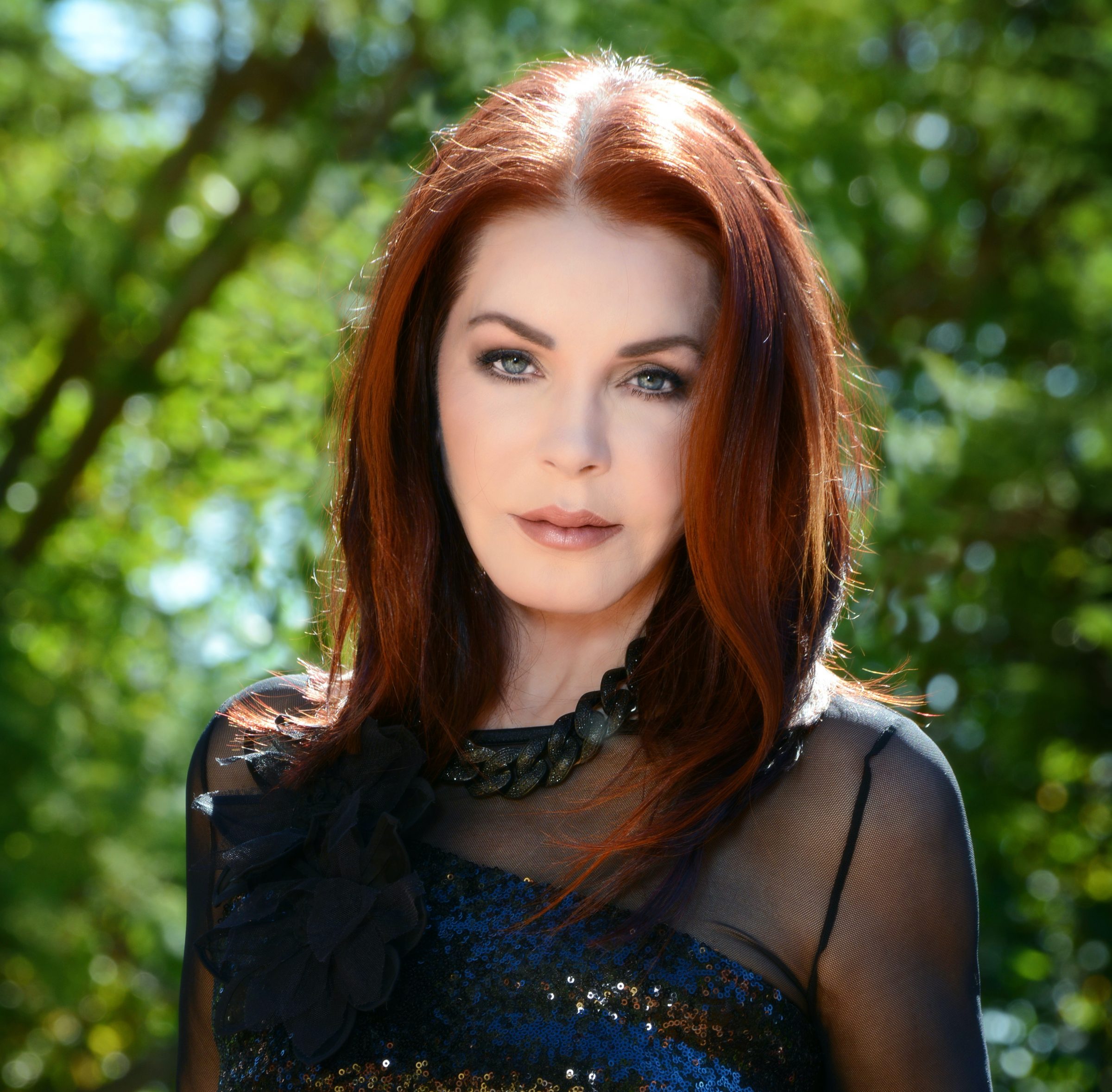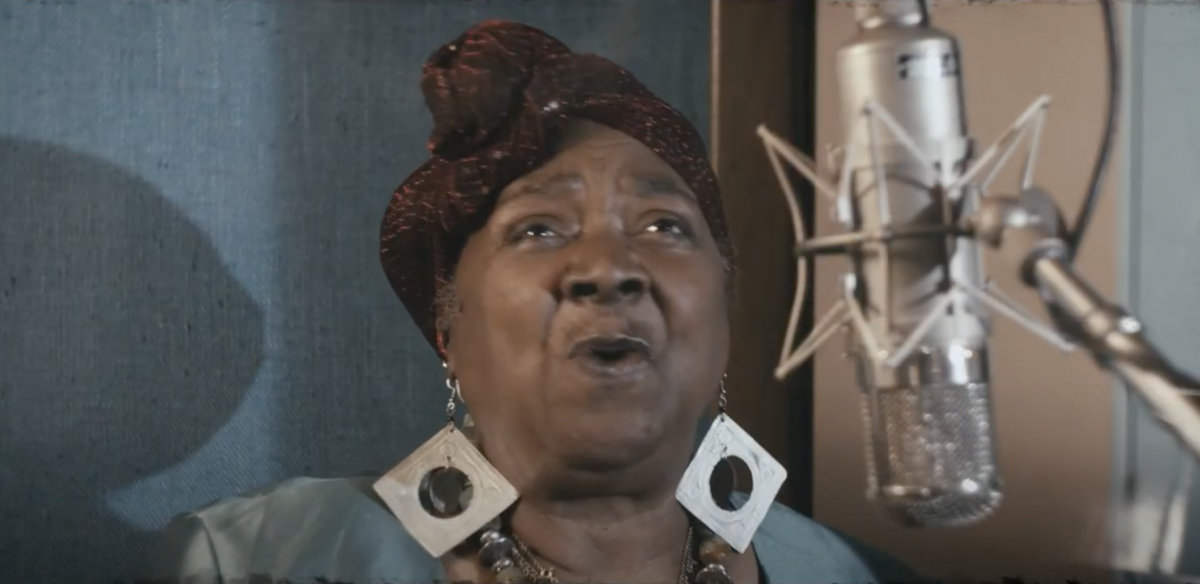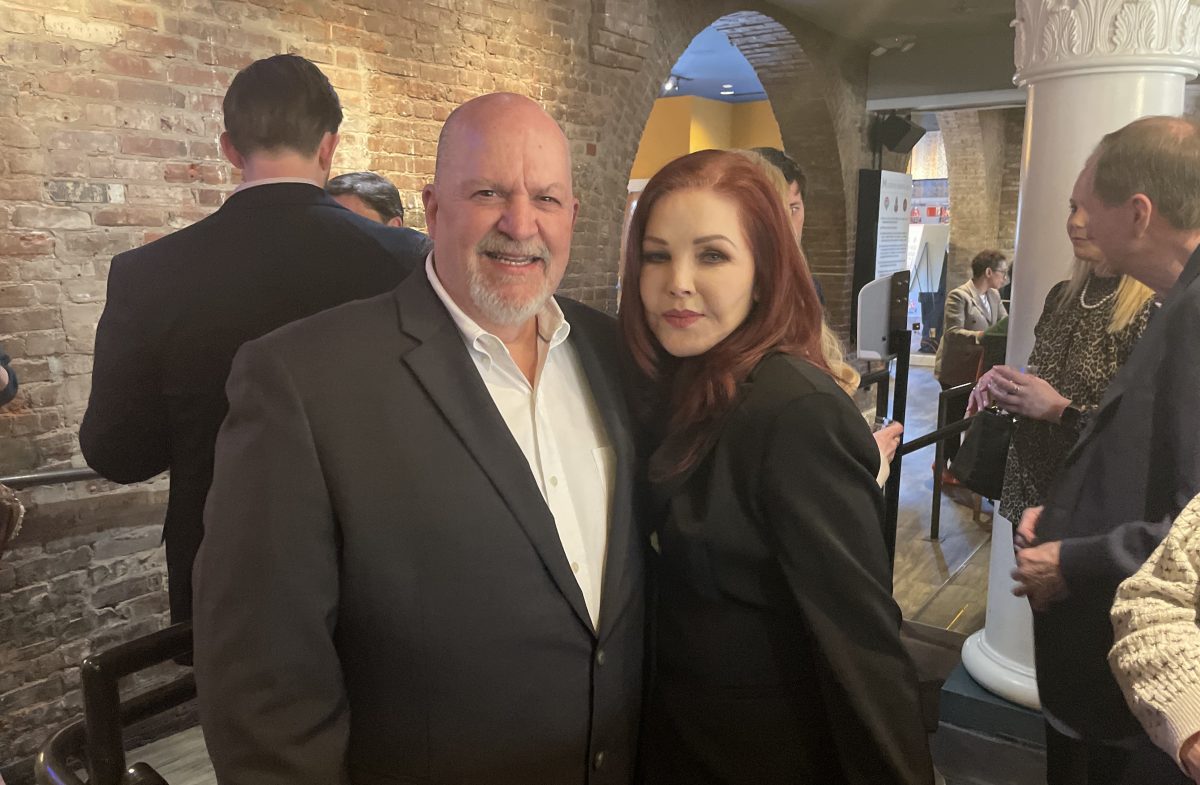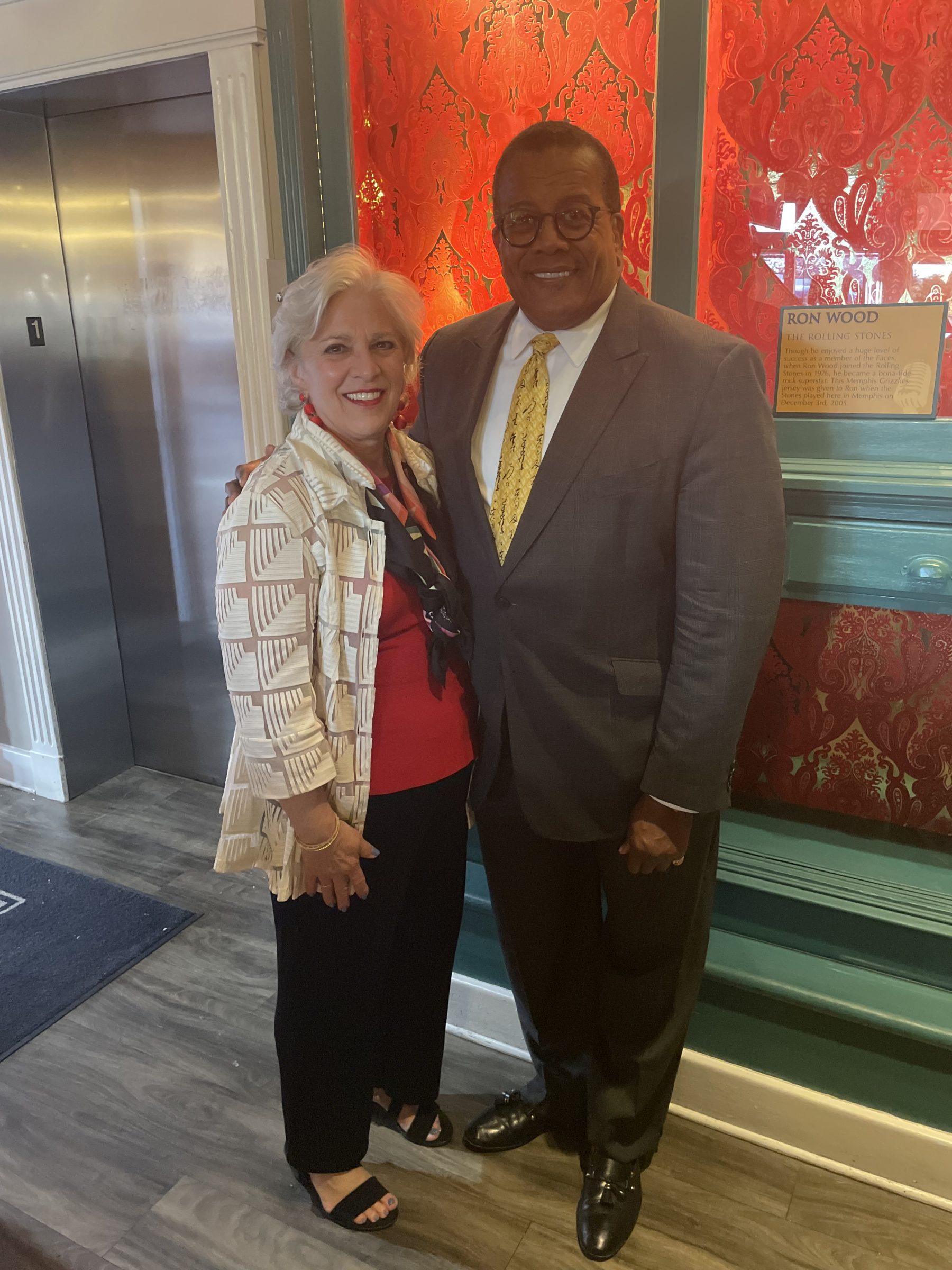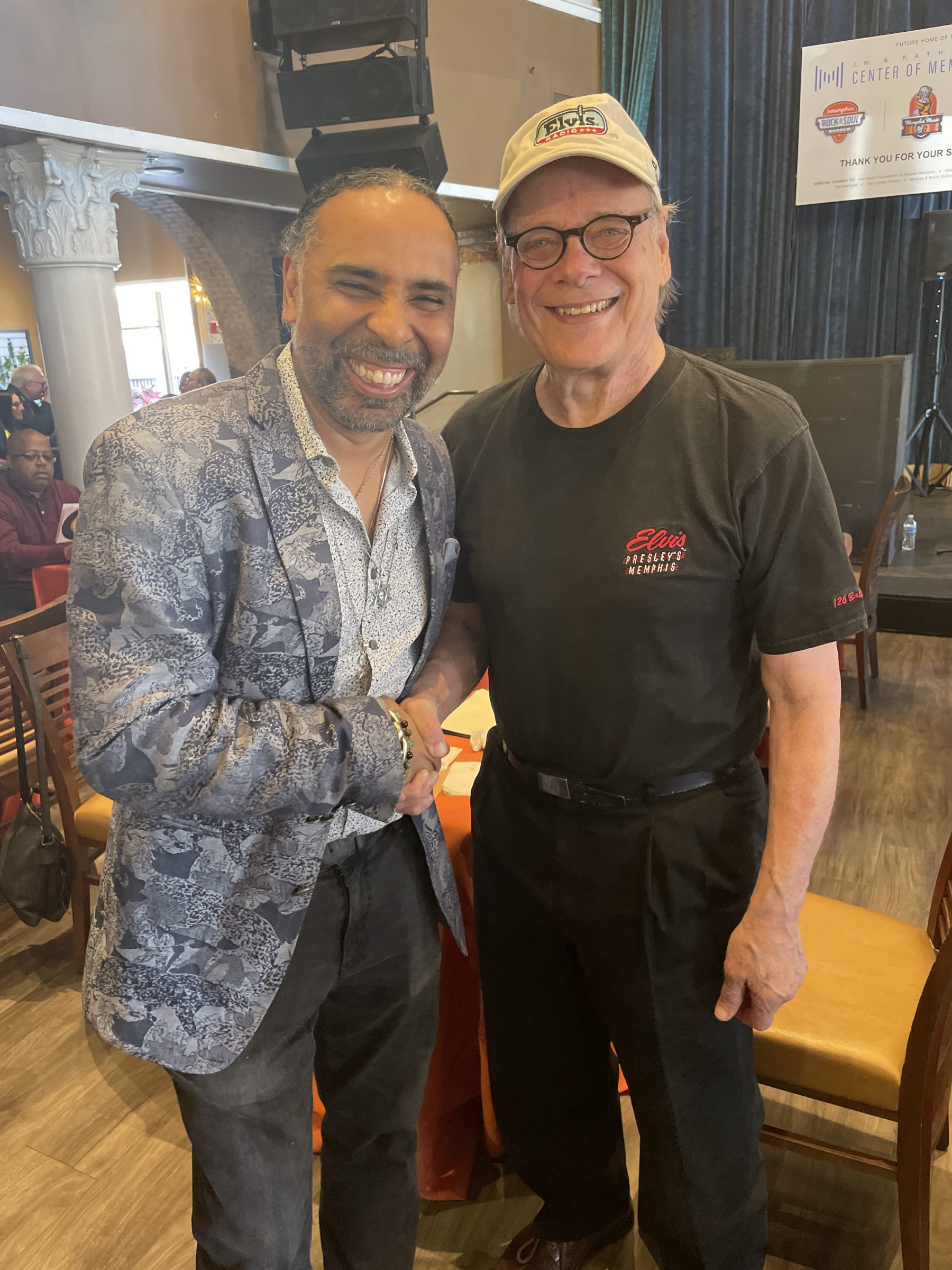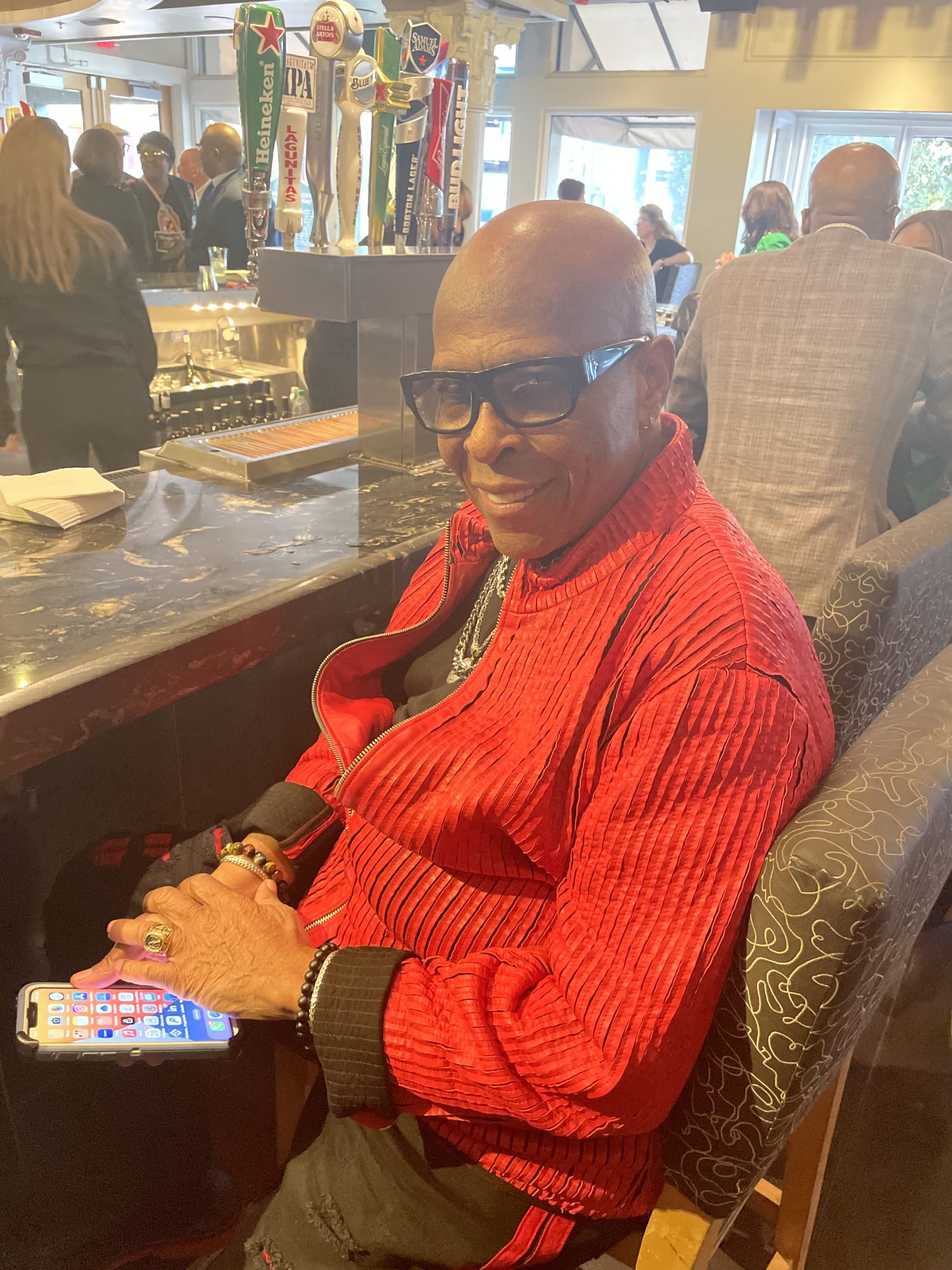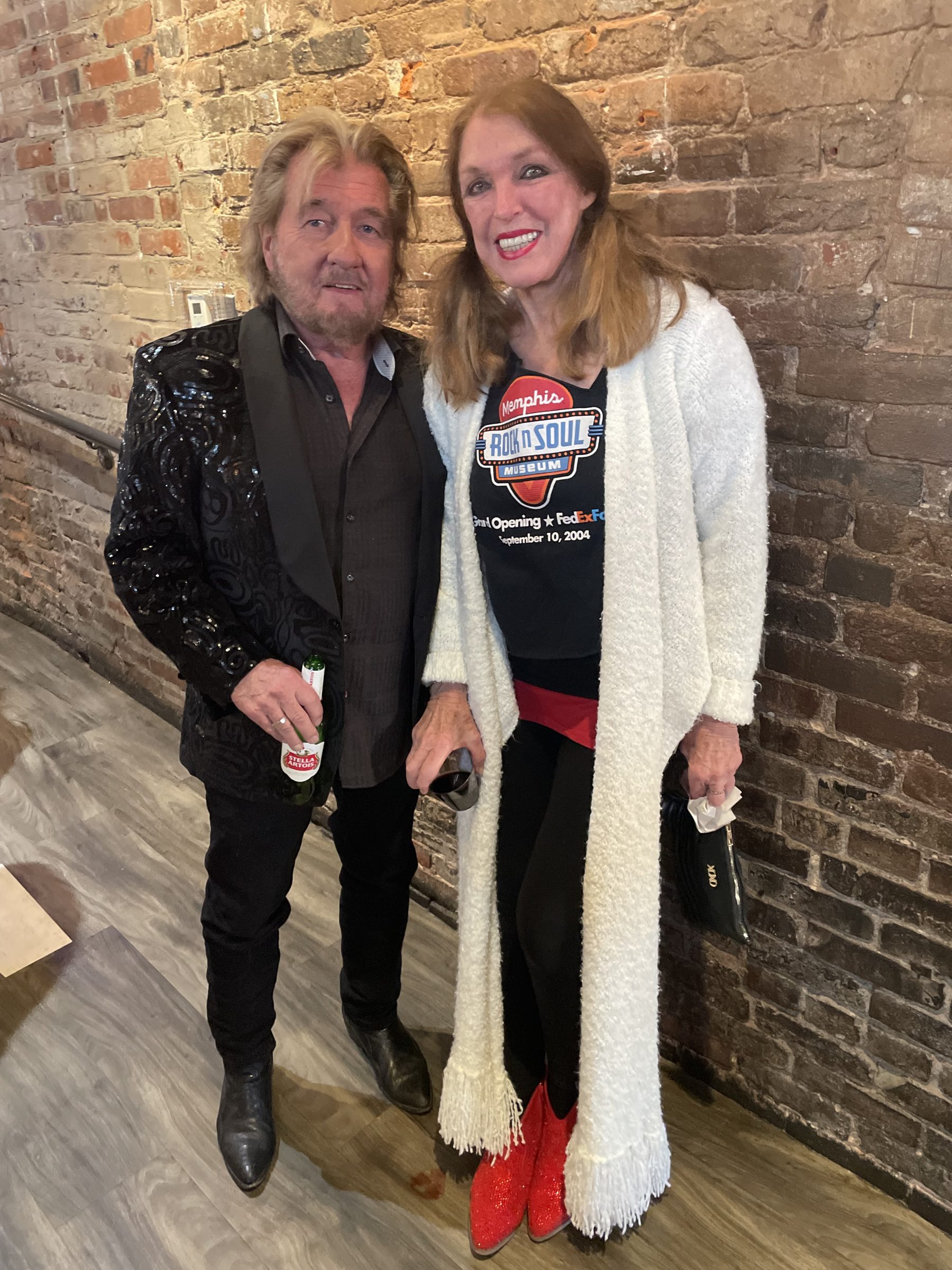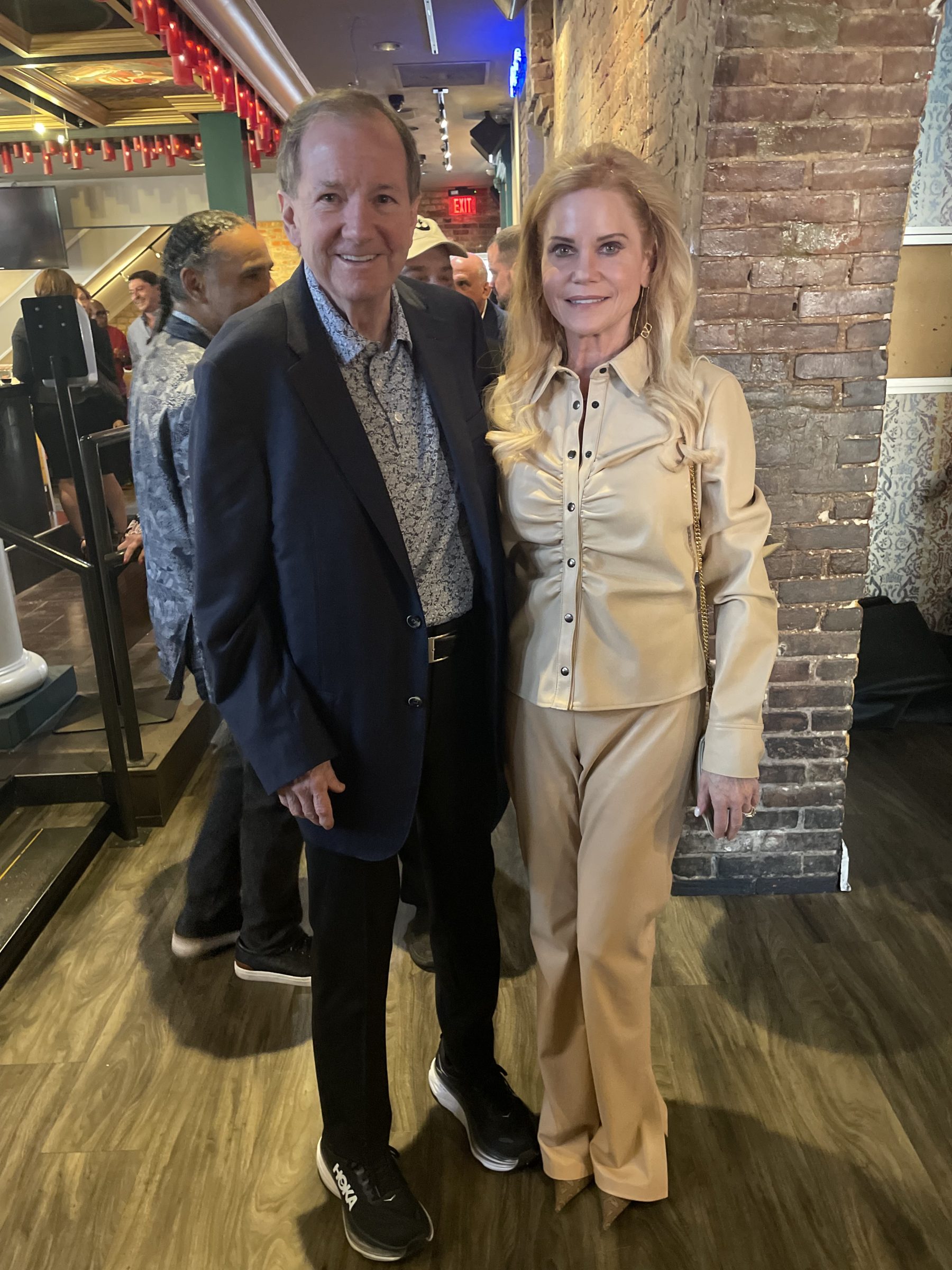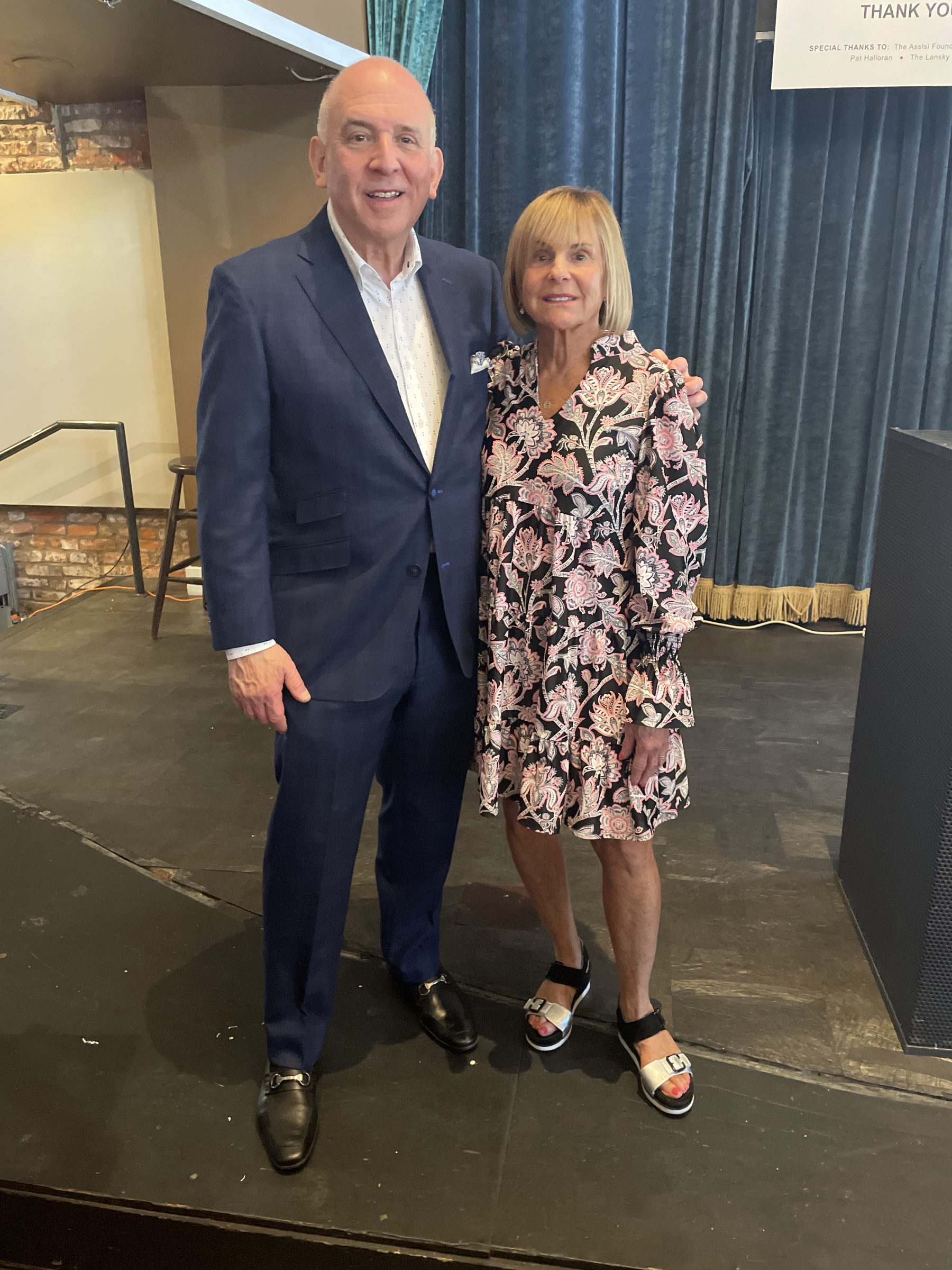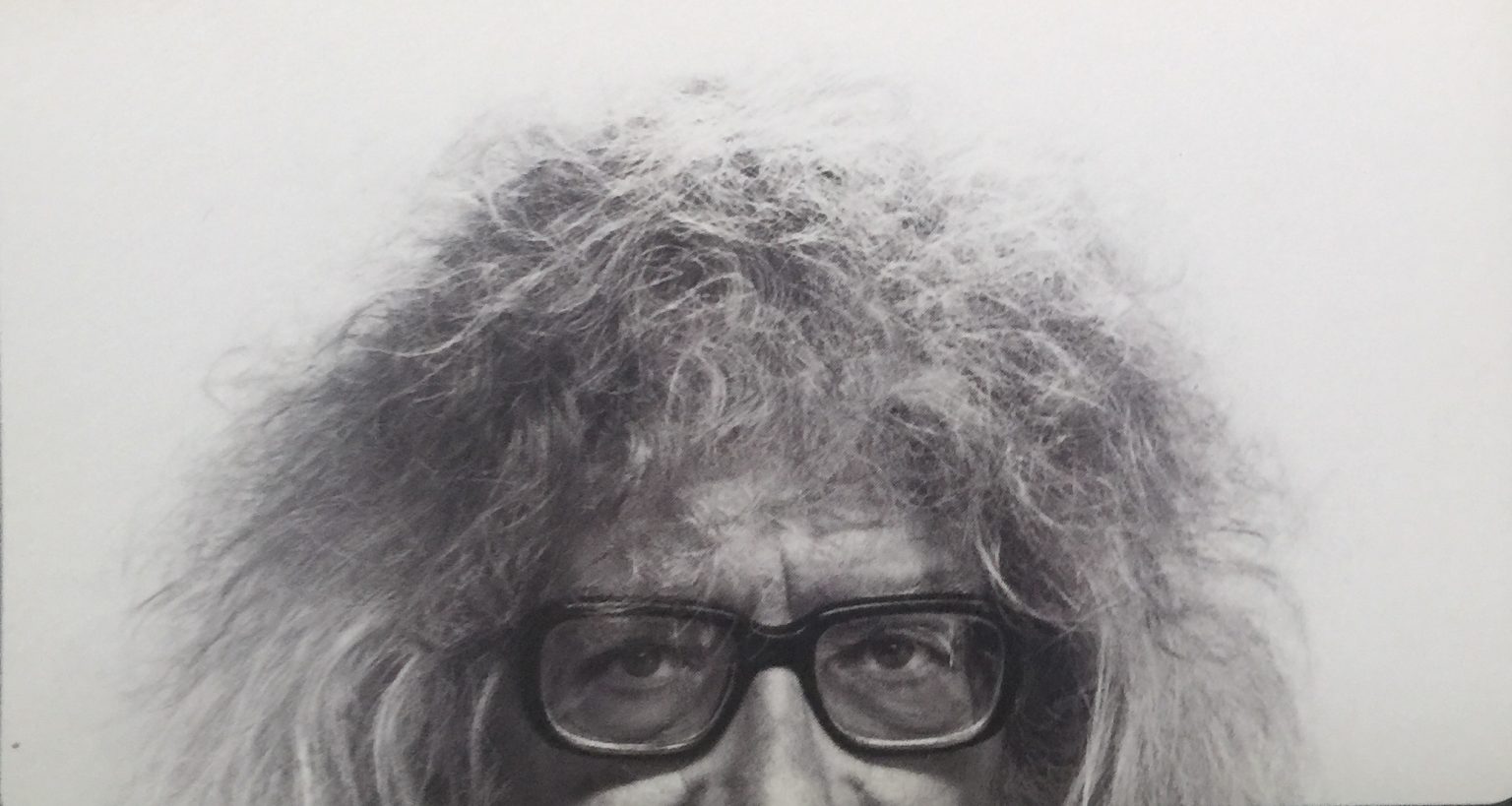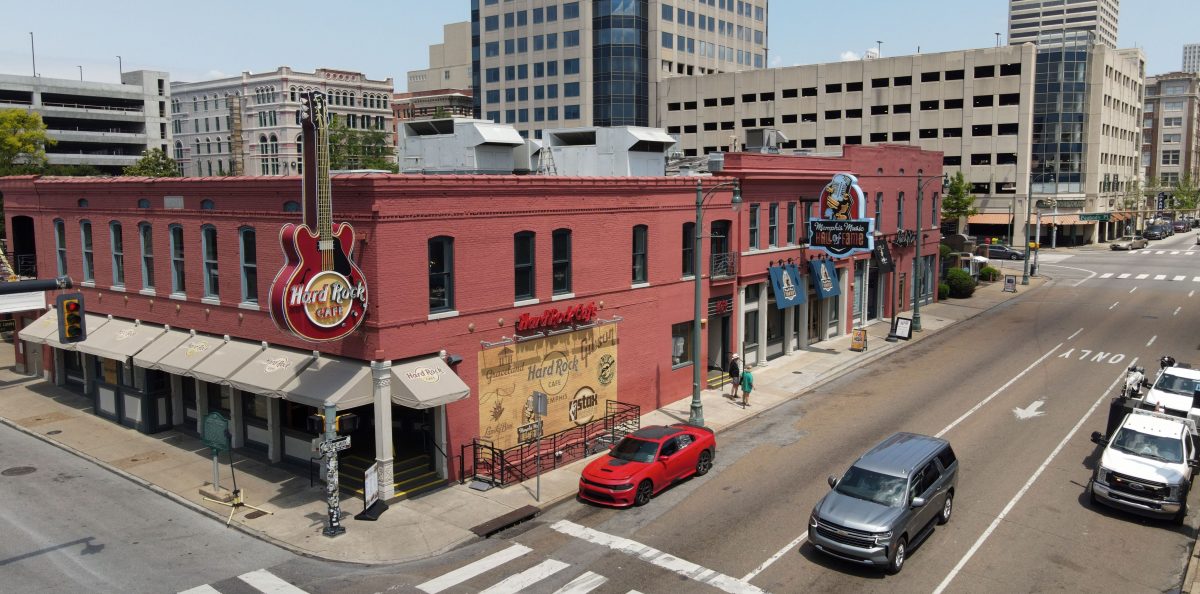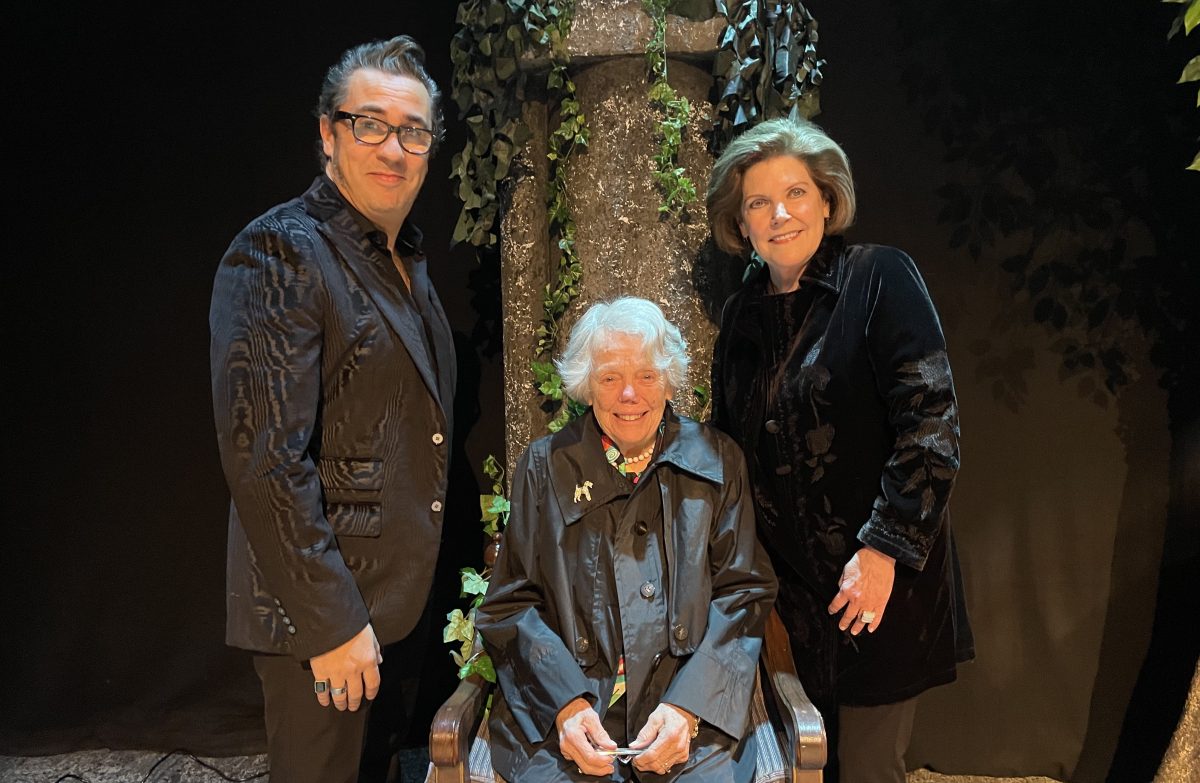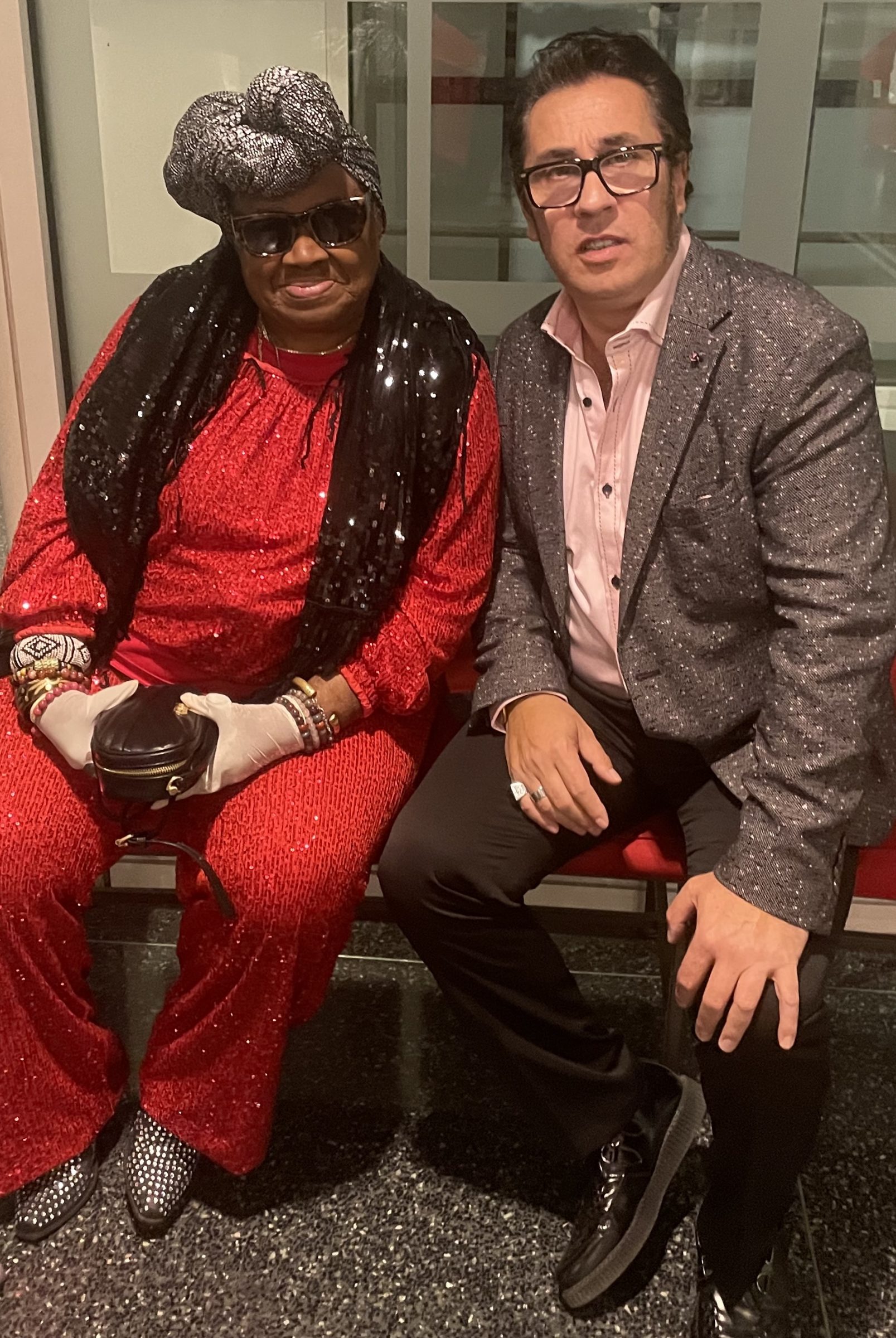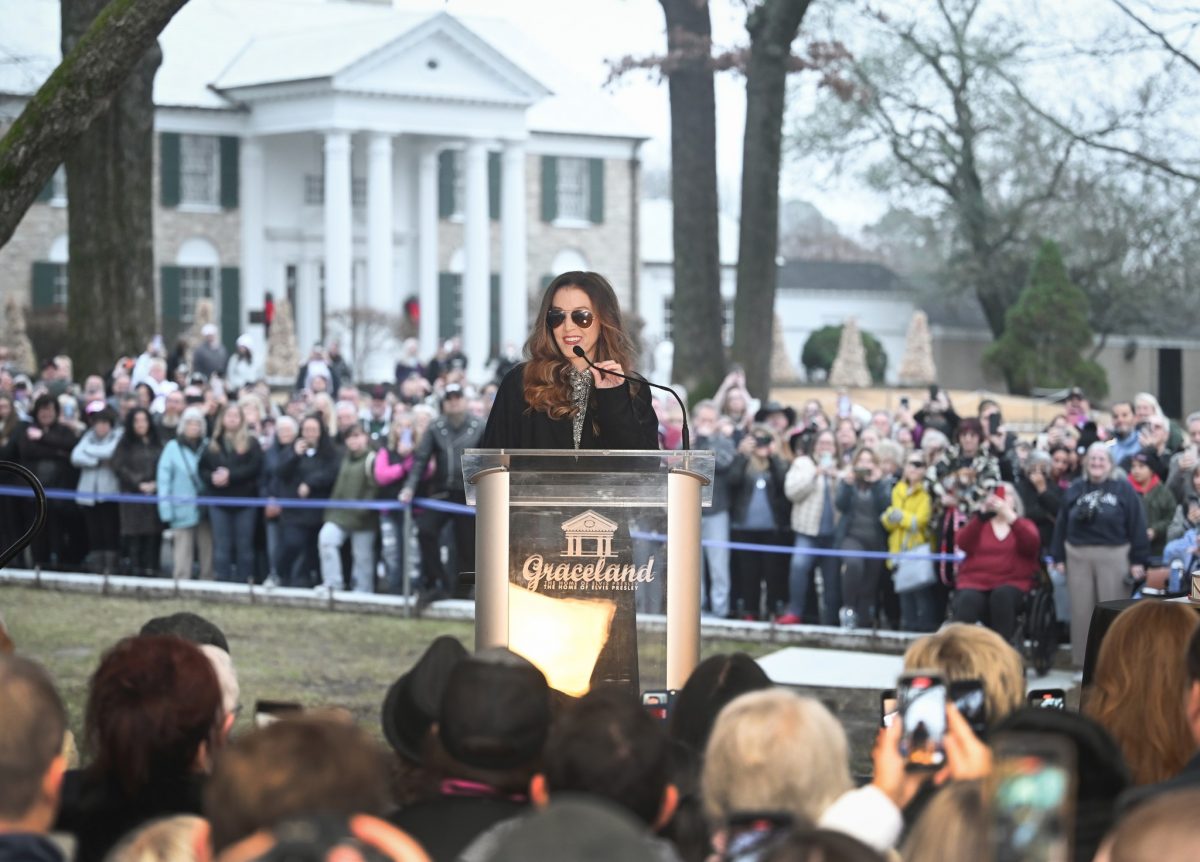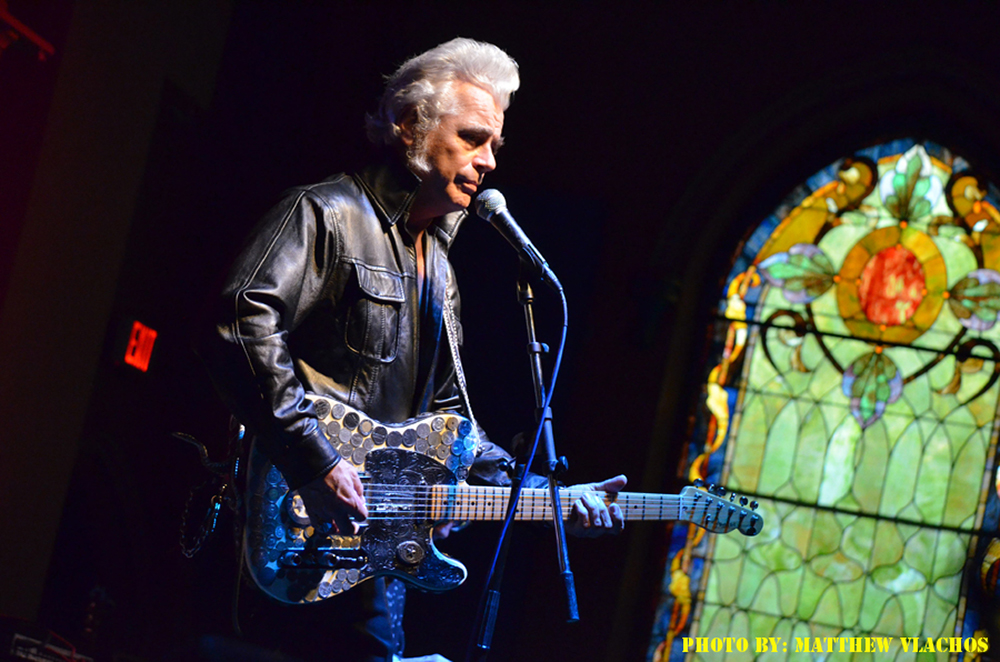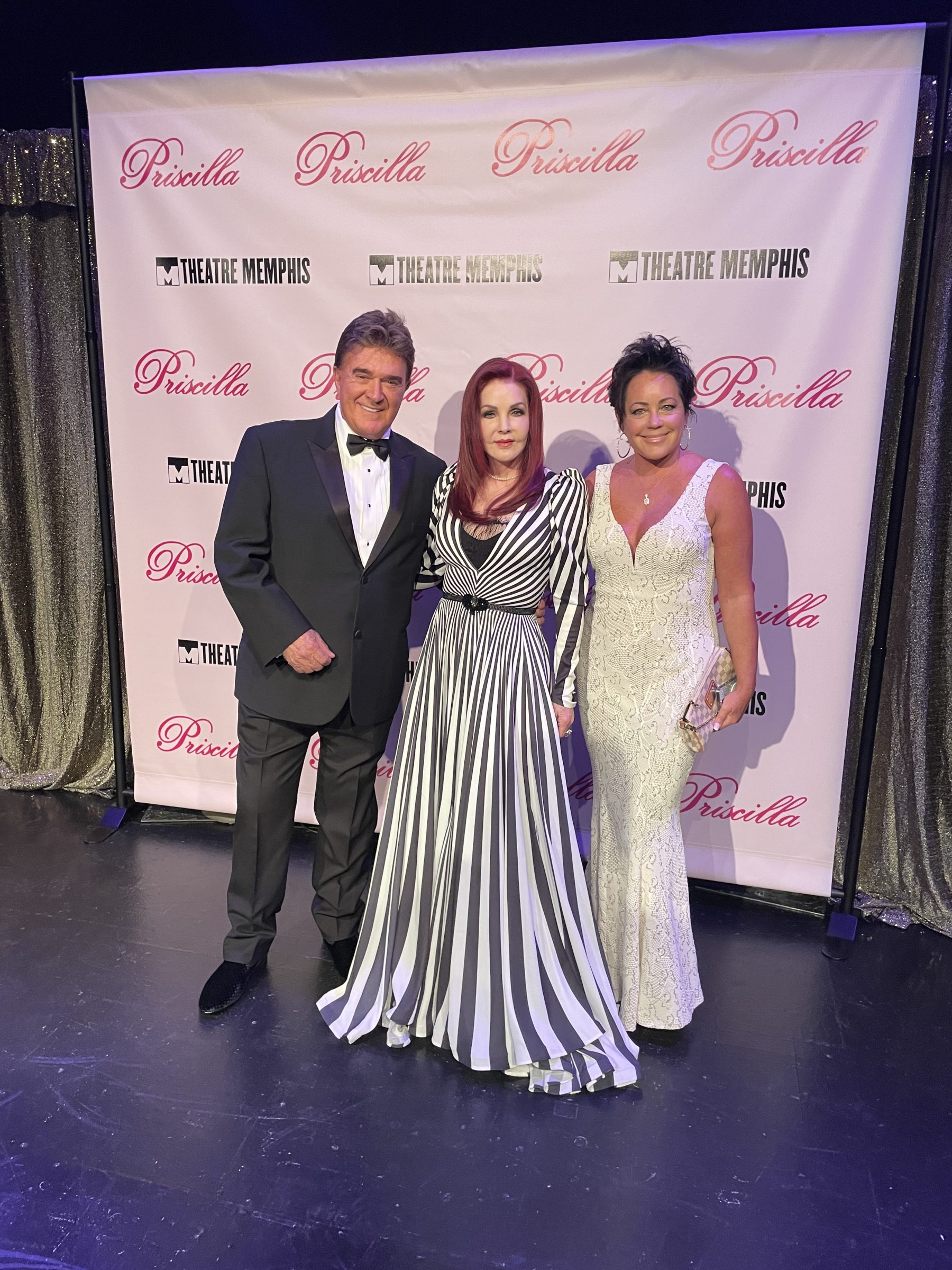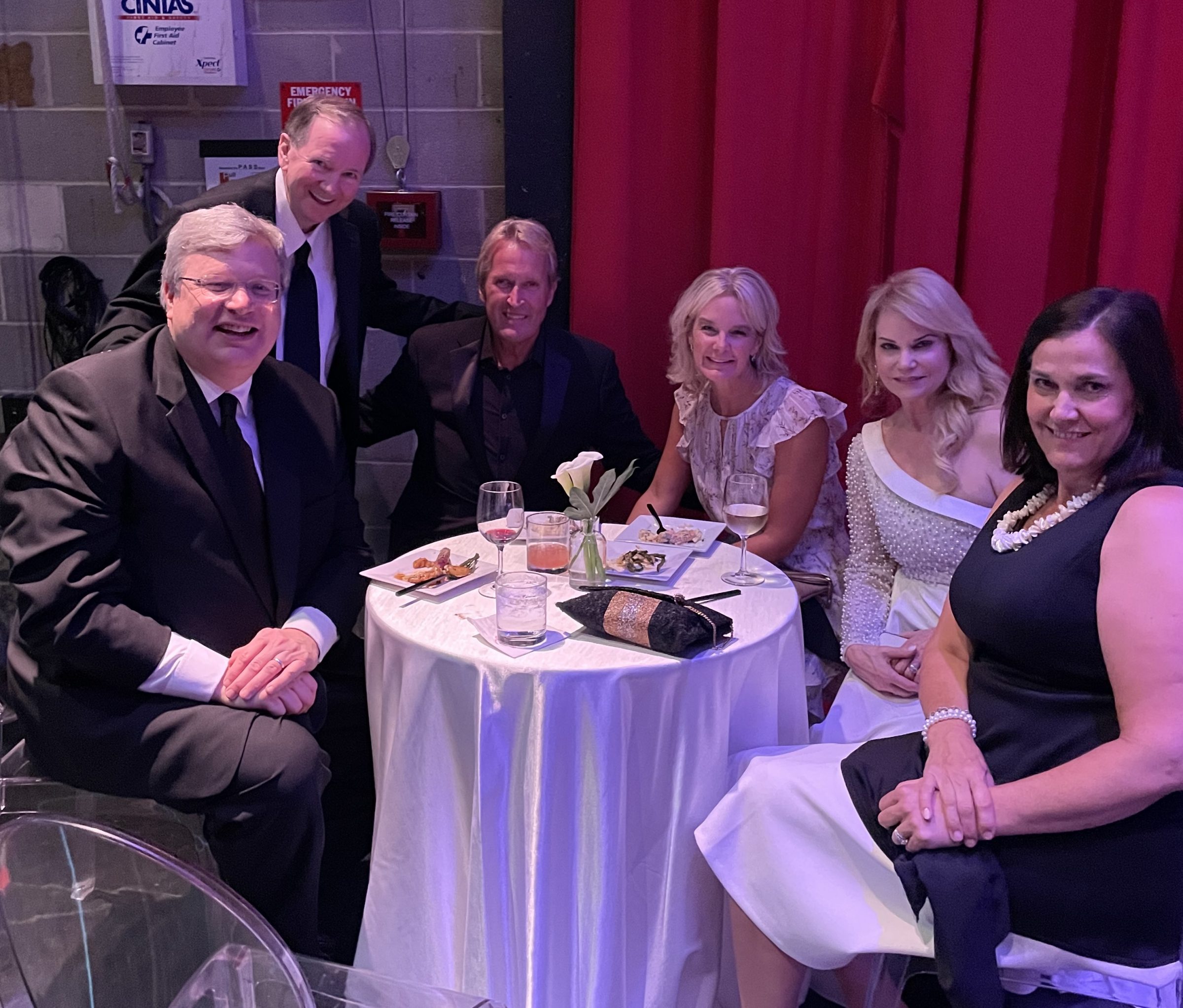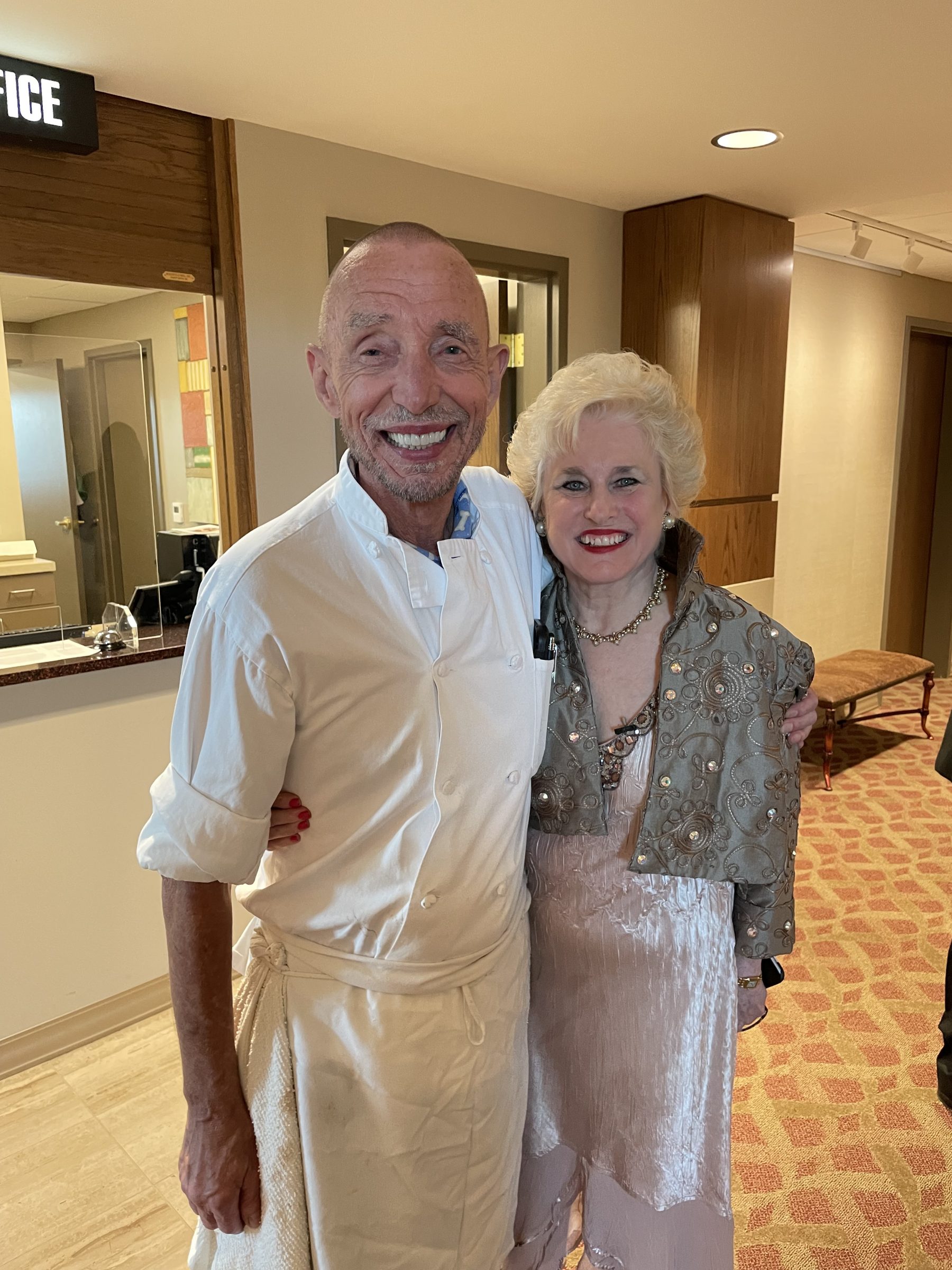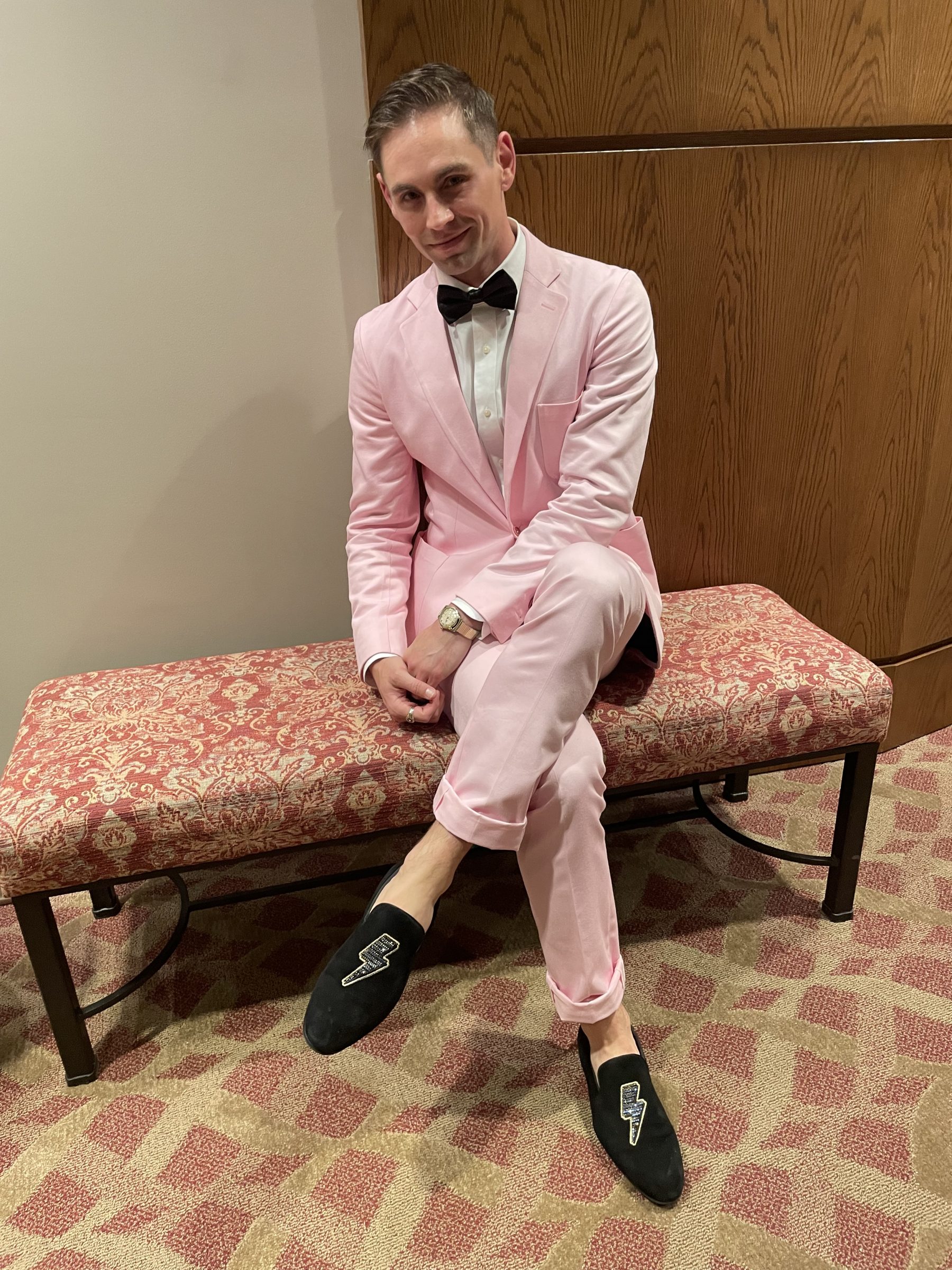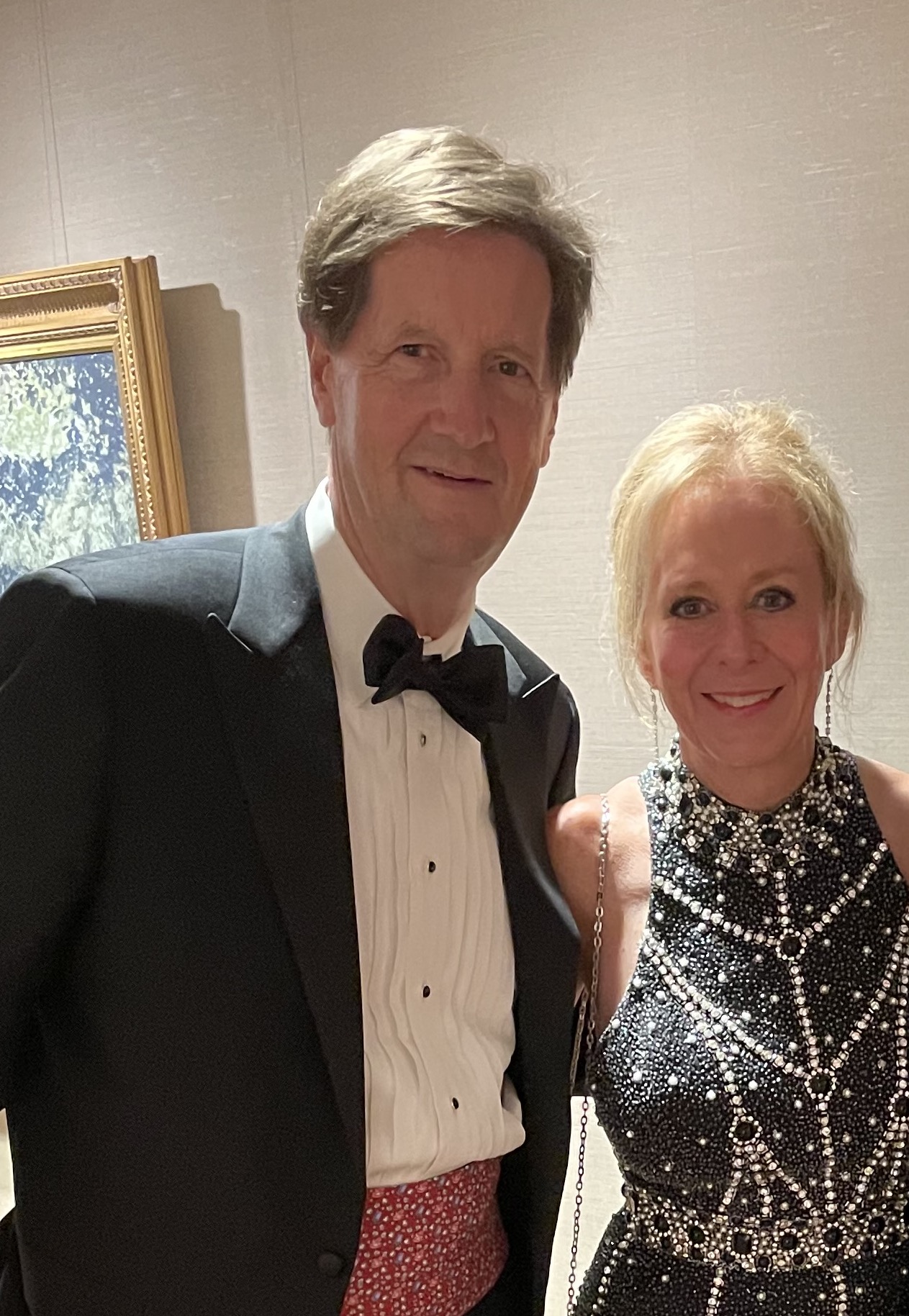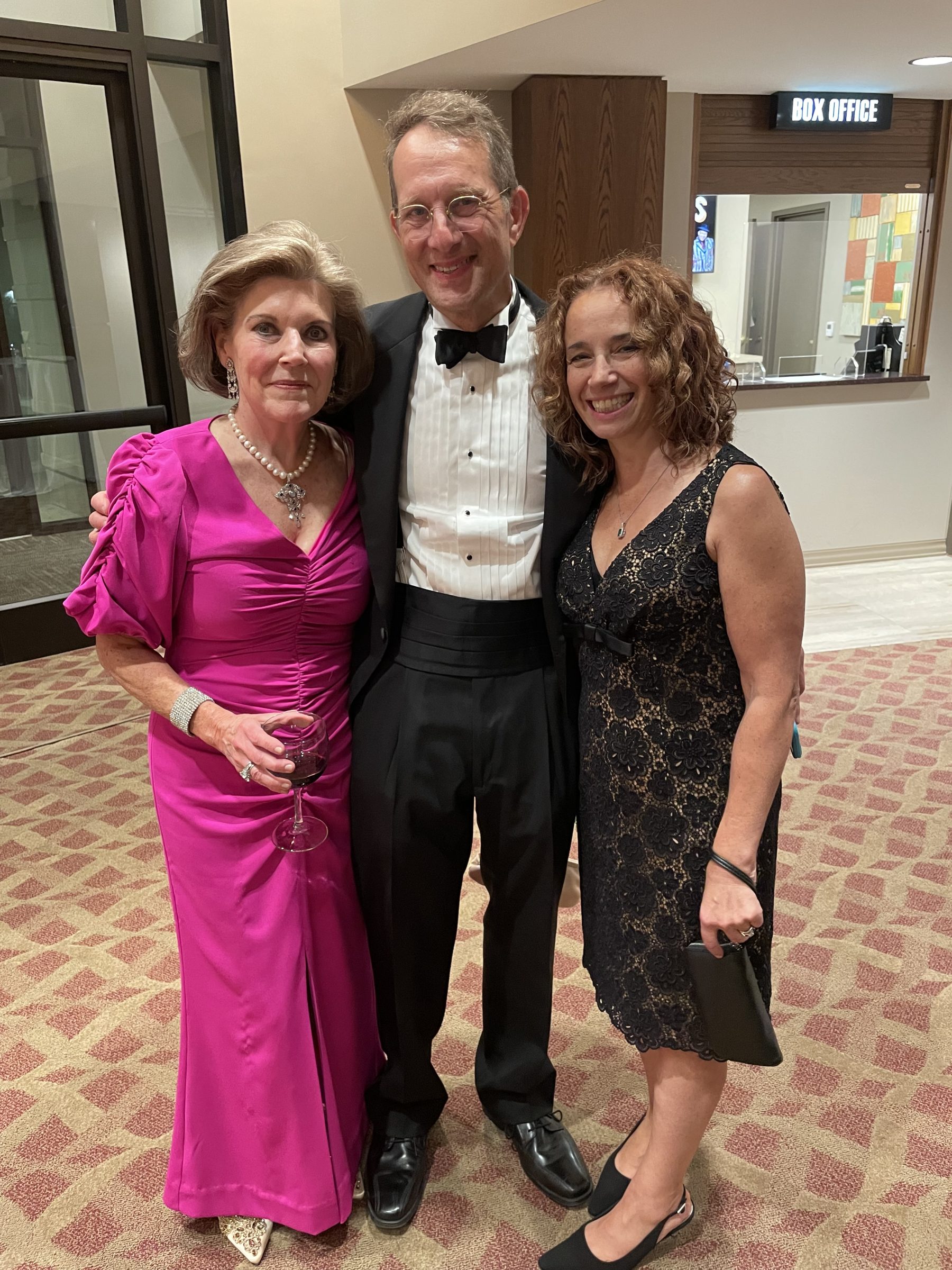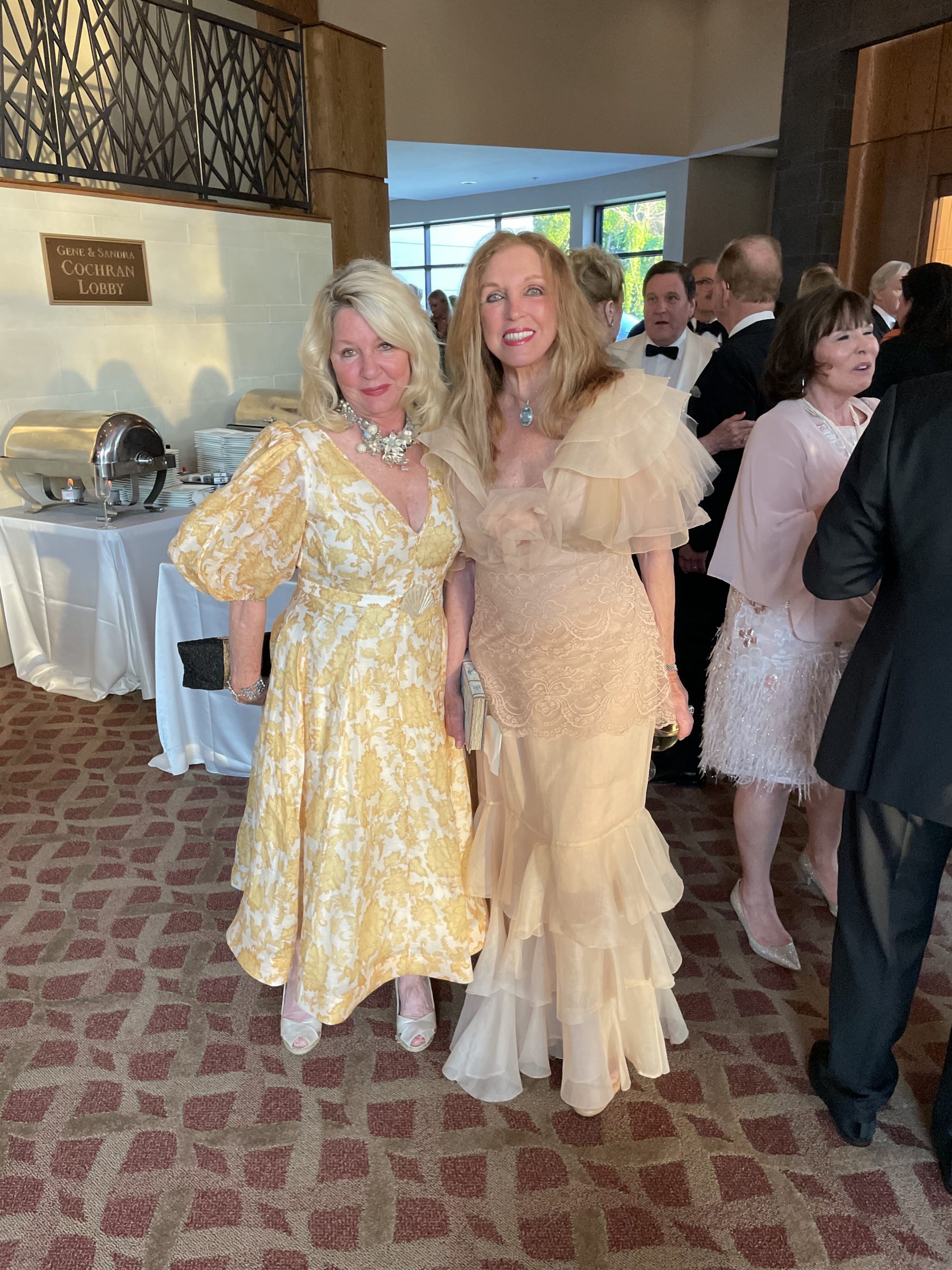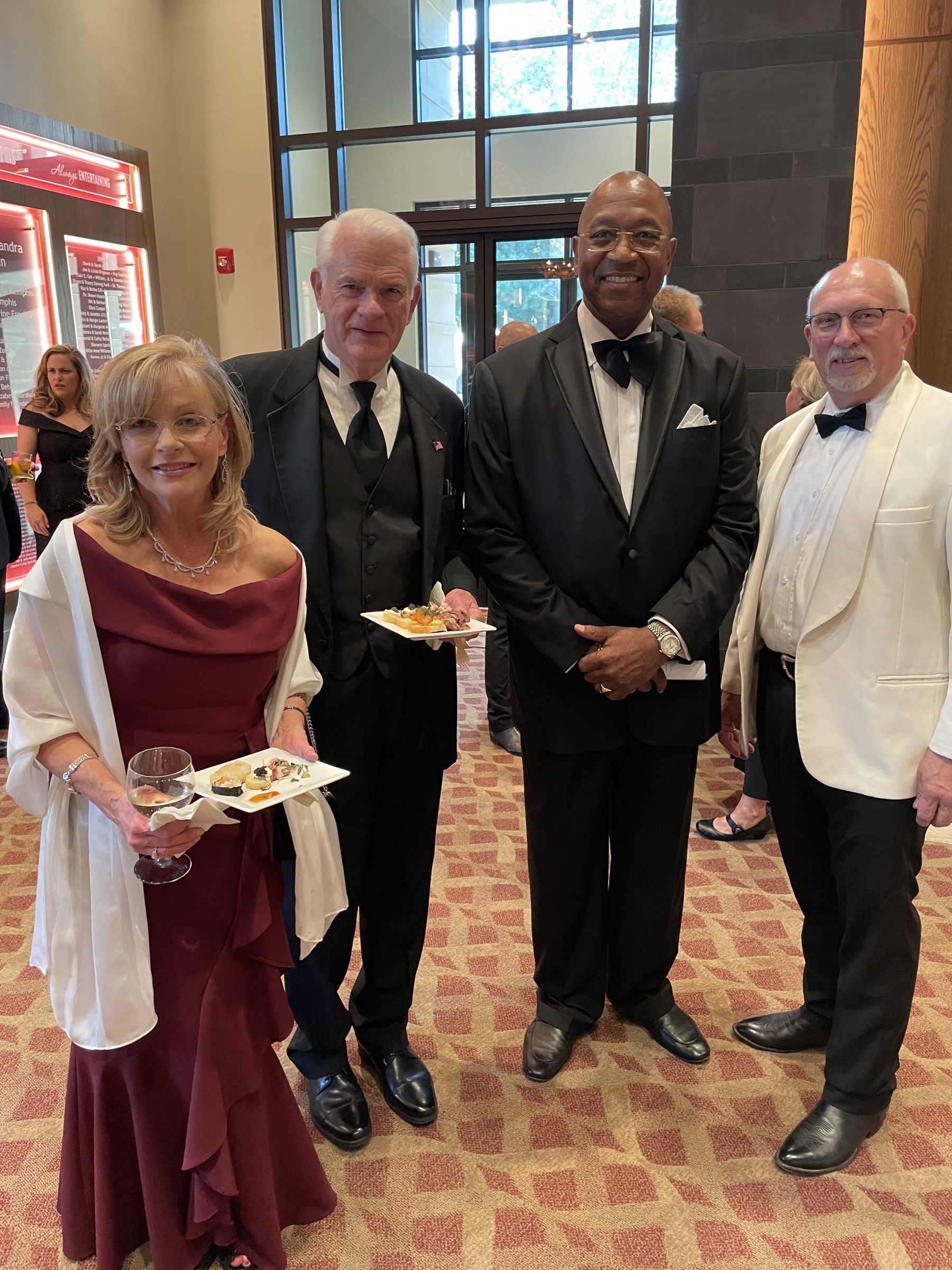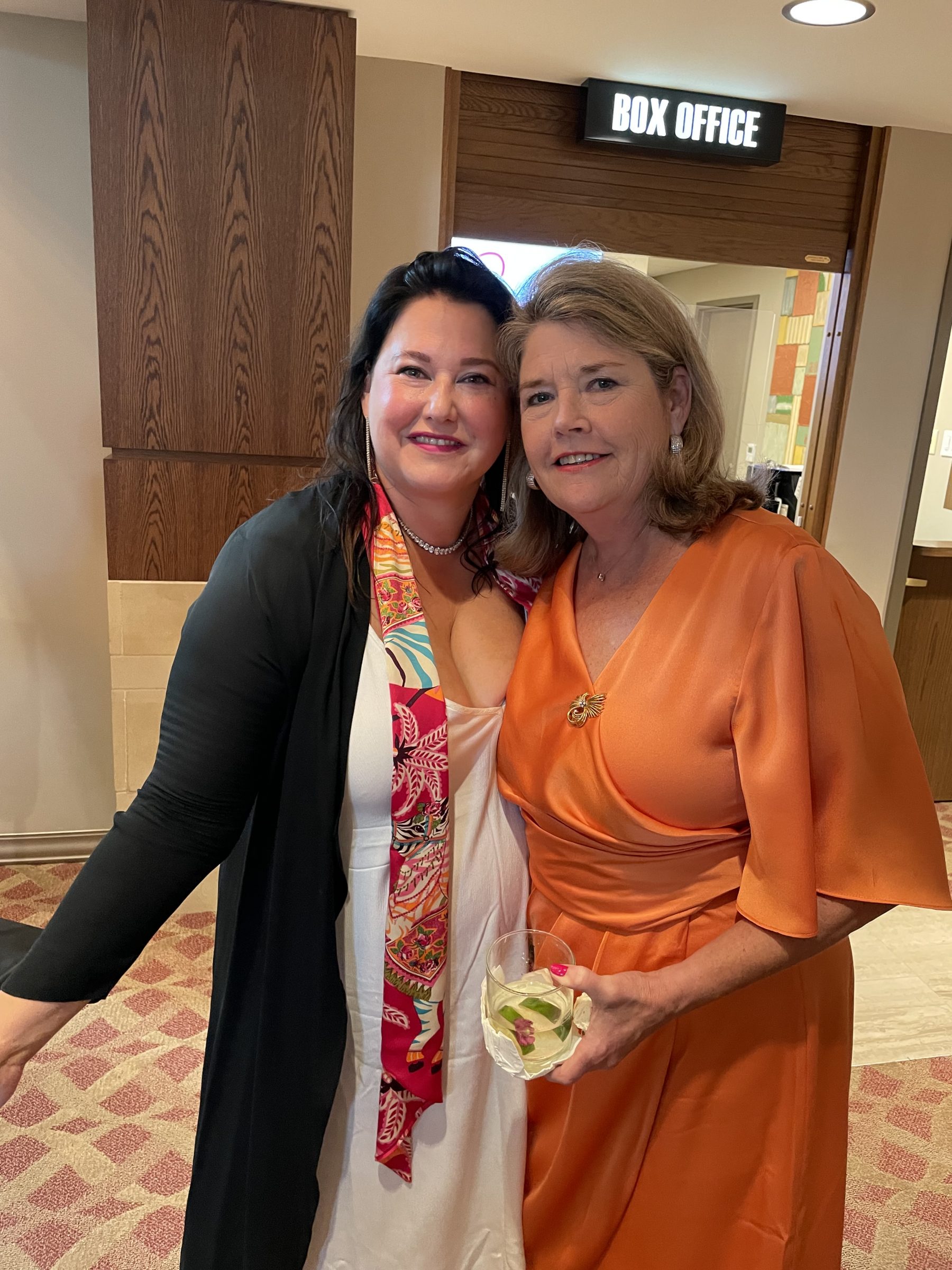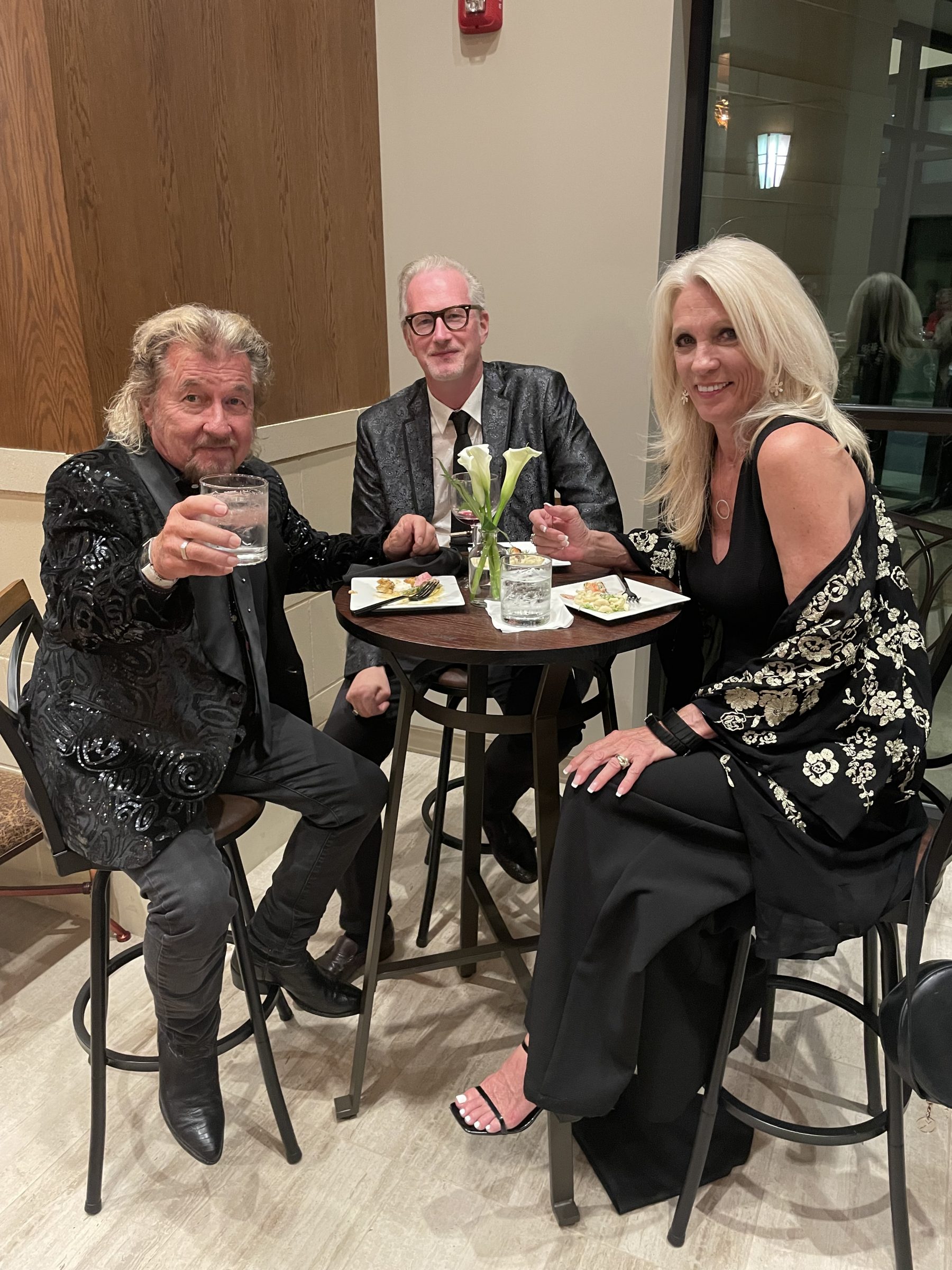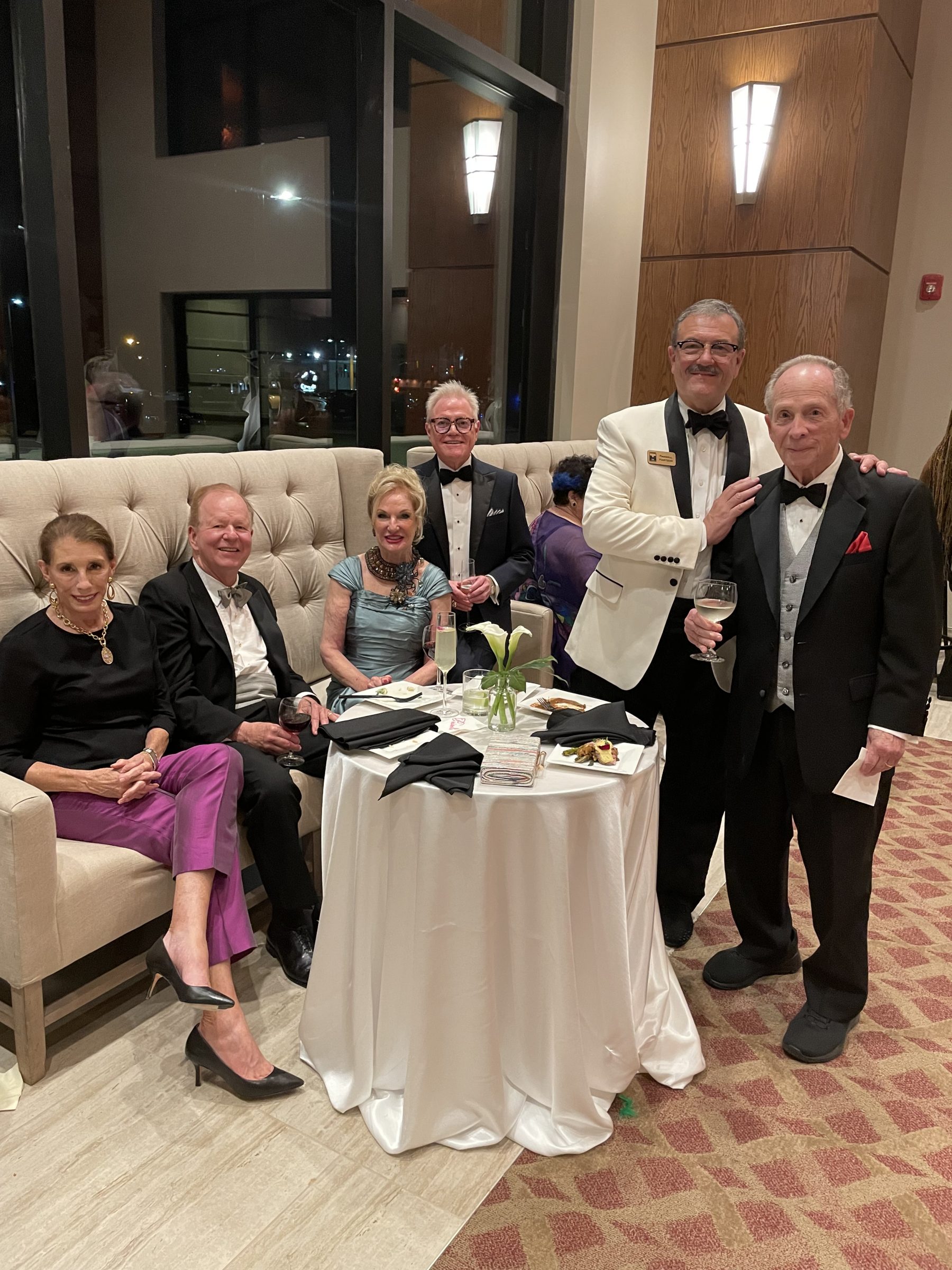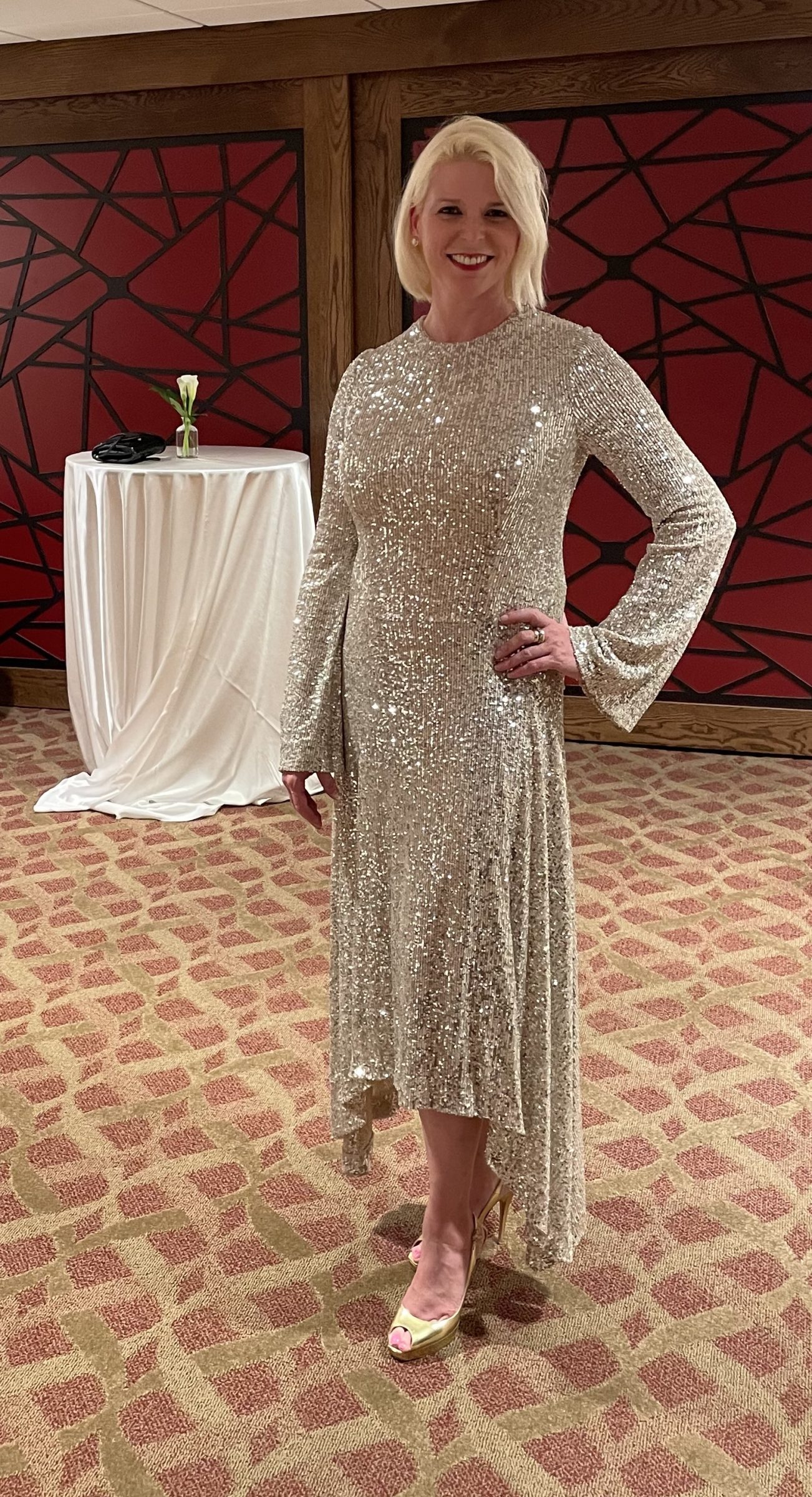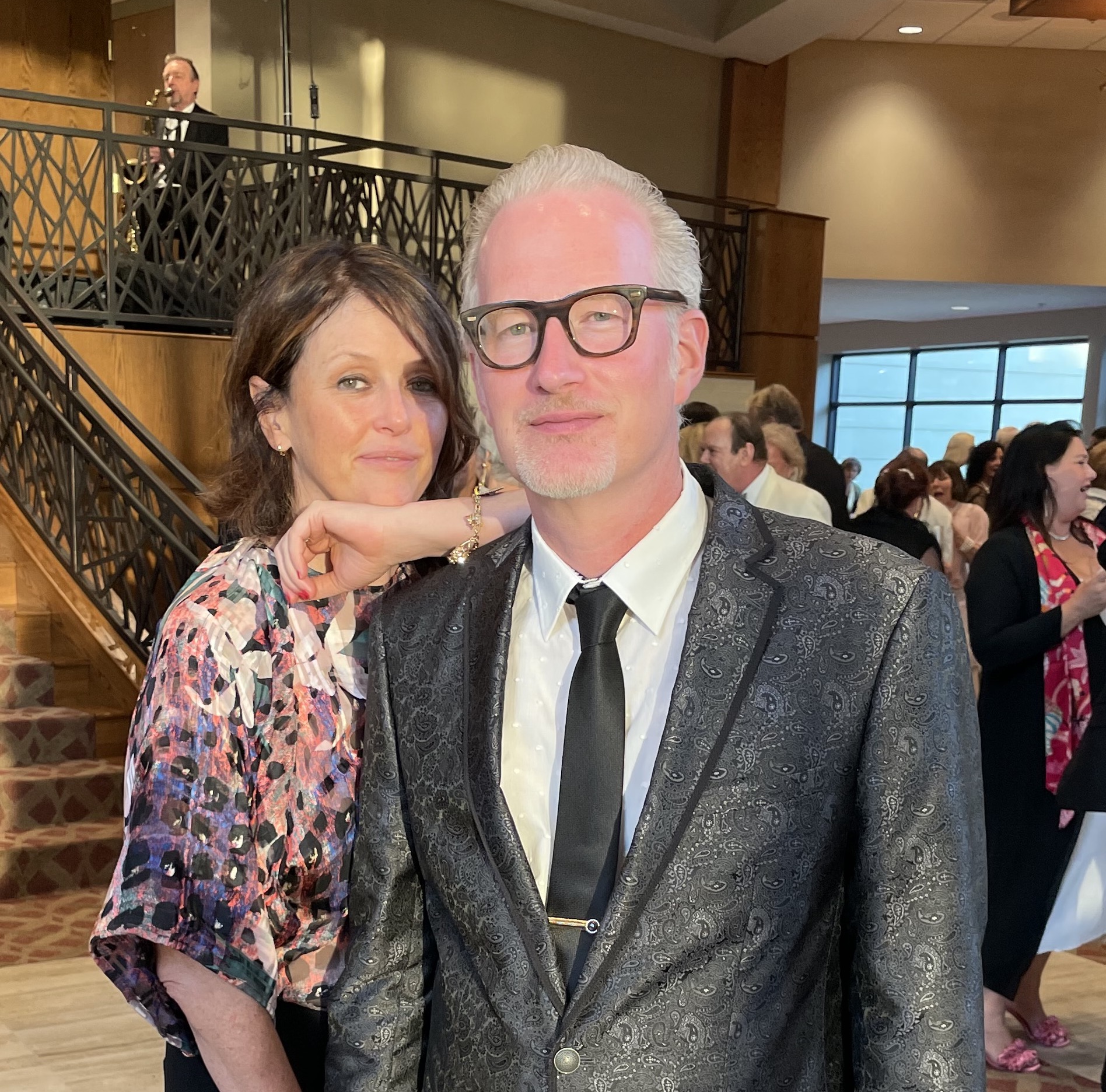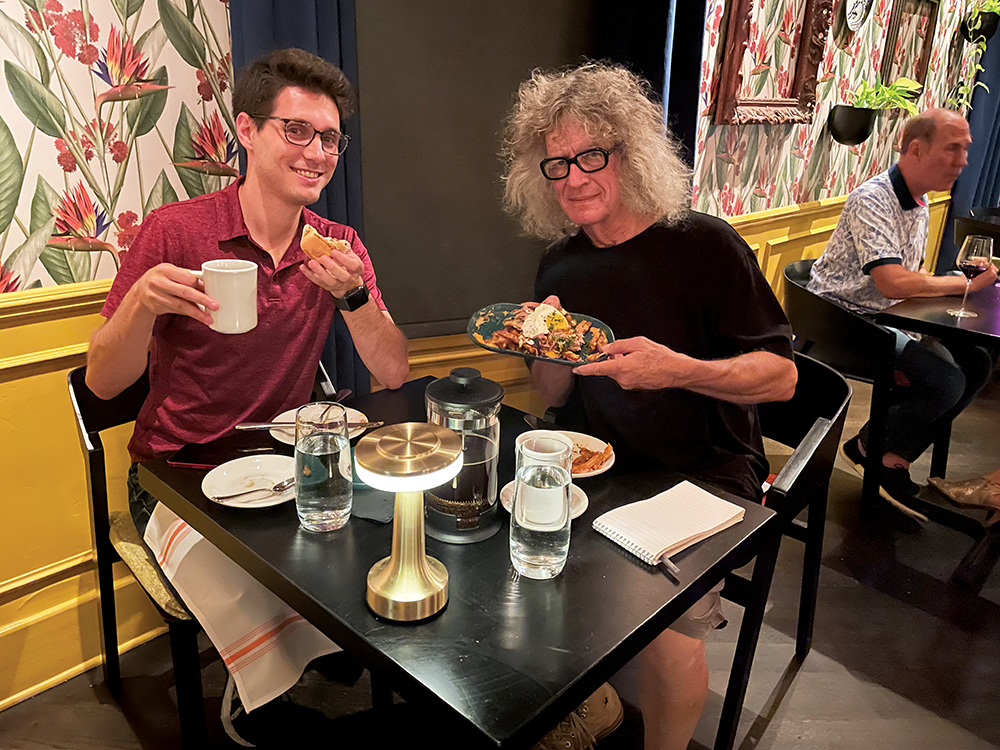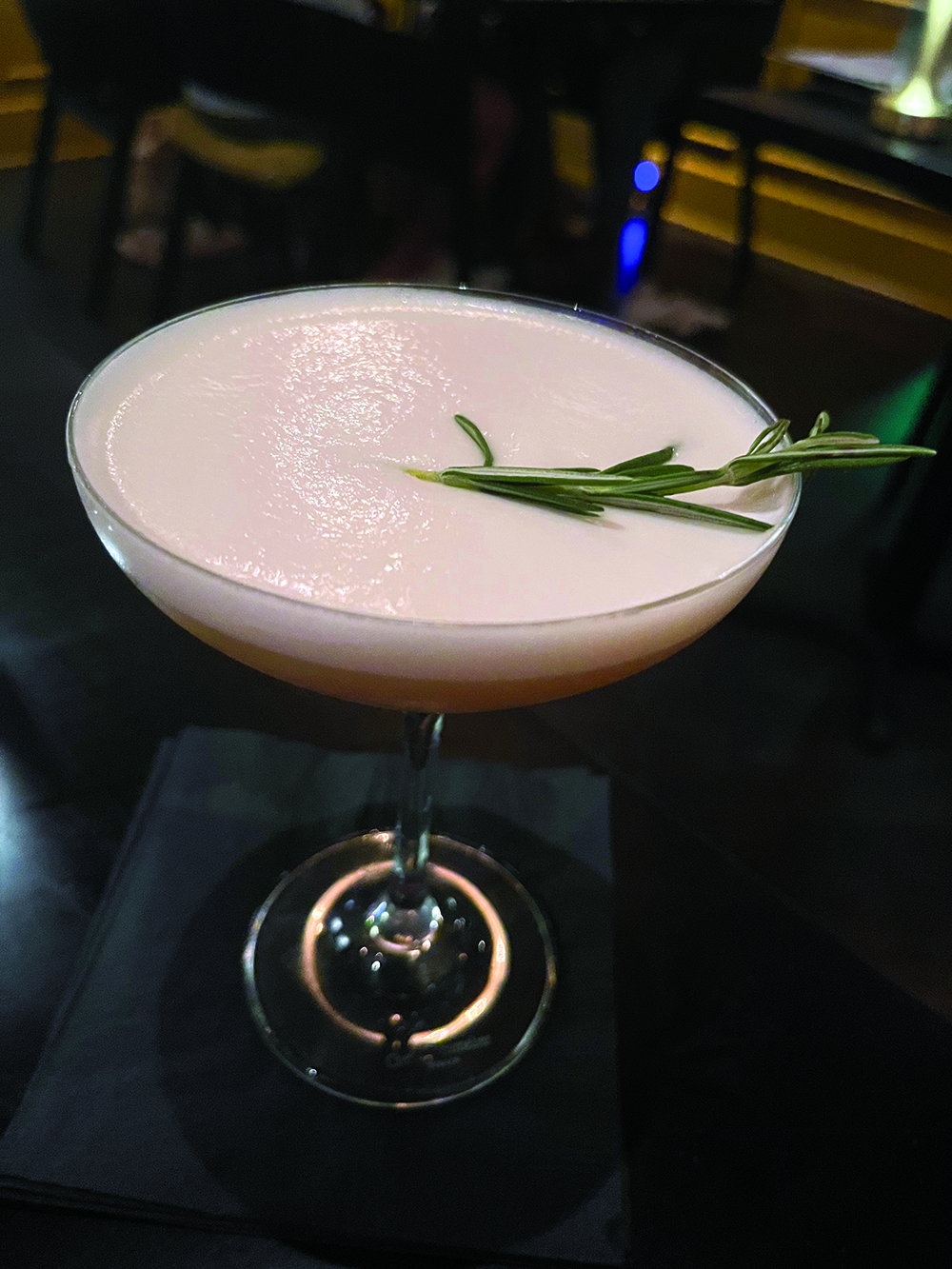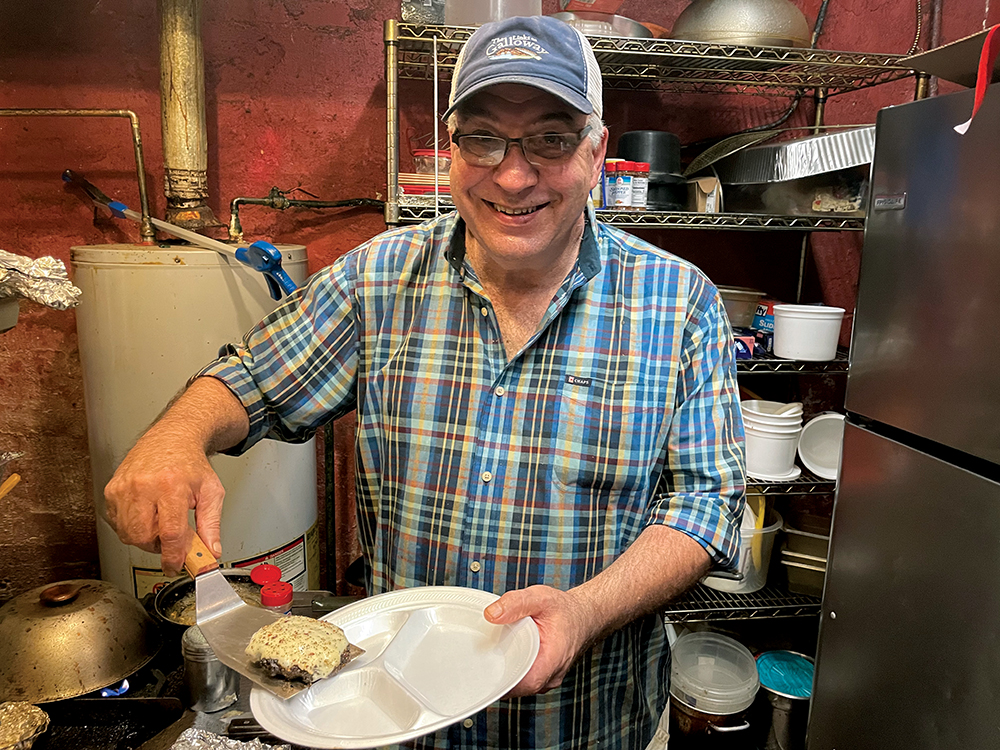“Would you like to take a look inside?” asks Josh Harper of the Memphis Music Hall of Fame, as I stare at the white and pink letters on a black door, spelling out some of the most revered words in the annals of rock-and-roll fashion: Lansky Bros., Memphis, Since 1946. That’s an offer no inquisitive journalist can refuse, and when Harper turns the key, it’s as if he’s opened a portal into the past. The brick walls of the clothier’s longtime location at 126 Beale Street, now vacated in favor of the newer Lansky at the Peabody boutique, exude an aura of living, breathing history, dating back to the structure’s incarnation as Burke’s Carriages in the early days of Beale.
“The building used to be two buildings that were bricked together,” says John Doyle, executive director of both the Memphis Music Hall of Fame (MMHOF) and the Memphis Rock ‘n’ Soul Museum. “On the second floor, they shoed horses. There was a ramp on the outside of the building where they walked the horses up there. A saloon was on the first floor. And the original hardwood floors are still there; the original beams are still there.”
Doyle has every reason to savor the history of the location, beyond the fact that the MMHOF museum was sandwiched between Lansky’s and the Hard Rock Cafe there for nearly a decade. Helming a museum makes one partial to the legacy of any building, especially when it’s destined to be the home of the very exhibitions you manage. And that’s precisely what’s in store for the Memphis Rock ‘n’ Soul Museum.
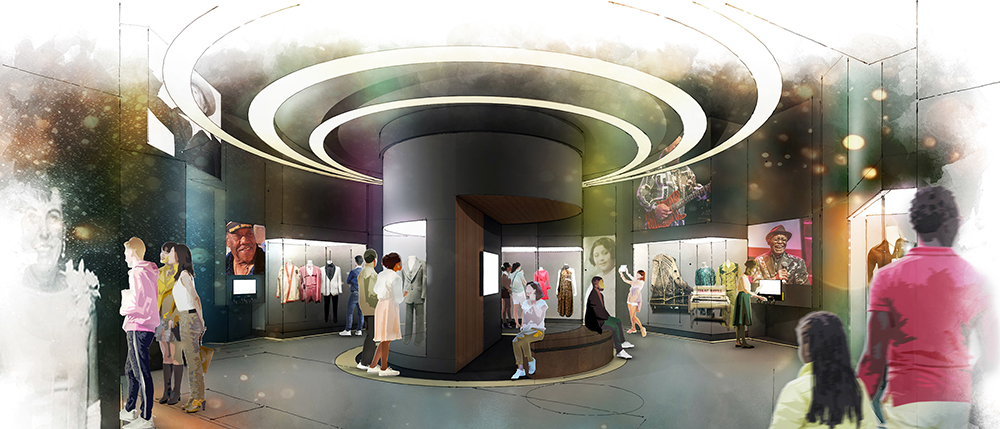
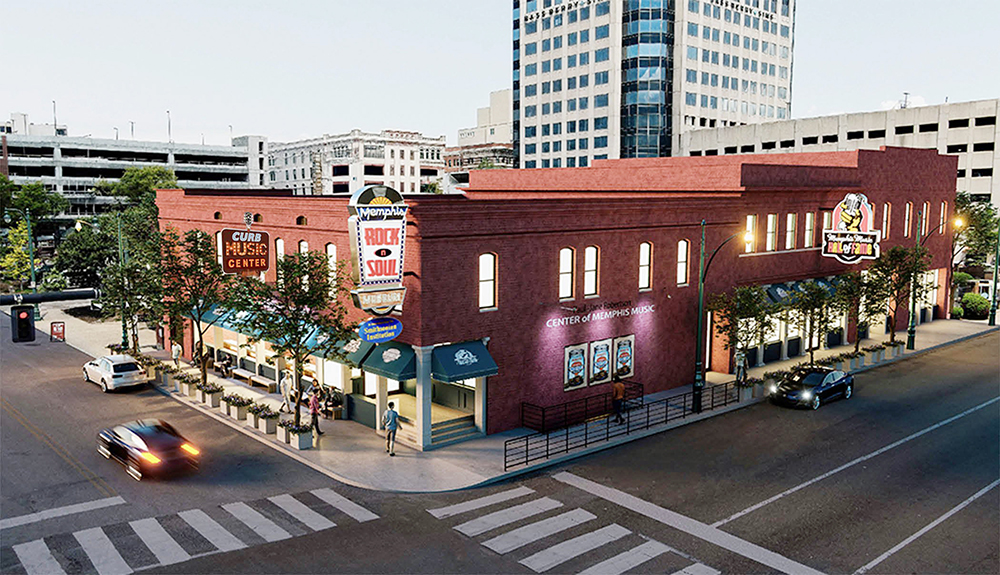
Artists’ renderings of the future J.W. and Kathy Gibson Center for Music
Photos: (top) Courtesy Memphis Rock ‘n’ Soul Museum; (bottom) Courtesy Mike Curb Family Foundation
A Movable Feast
The move was made public one year ago at a press conference outside the building that featured Doyle, businessman J.W. Gibson, and host Priscilla Presley, where it was announced that Memphis Rock ‘n’ Soul Inc., the nonprofit that operates both the museum and MMHOF, had purchased 126 Beale from Lansky’s for $5 million with funding from Gibson, Mike Curb, and other benefactors. The highlight of the event was the unveiling of a sign marking the address as the new “J.W. and Kathy Gibson Center for Music” that will include MMHOF, Rock ‘n’ Soul, and the Mike & Linda Curb Music Center.
As reported at the time by Bob Mehr in the Commercial Appeal, Gibson, who is chairman of the museum’s foundation board, said, “It’s Memphis music that I’m committed to, and that I think is sorely missing tremendous opportunities year after year. Since I’ve been on the board, I’ve been preaching the notion that we need to take advantage of the talent that Memphis has and the history we have. Memphis music is substantial to the music industry internationally. However, locally, what are we doing to uplift that industry, to support that industry? We saw an opportunity here.”
Naturally, migrating the museum into the space will take some time, but the institution has long had patience on its side. Now in its 25th year, Rock ‘n’ Soul occupies a unique niche in the local museum ecosystem. For one thing, it was launched by the Smithsonian Institution, the first of that venerable organization’s exhibitions to be located outside the Washington, D.C., area. Moreover, Rock ‘n’ Soul was uniquely peripatetic even before it opened, with its origins rooted in a traveling exhibition.
As Doyle explains, “When the Smithsonian was celebrating their 150th anniversary as a museum system, they decided to get some of their stuff out in the world and did an exhibit that toured the country. It included the ruby slippers from The Wizard of Oz, Abraham Lincoln’s stovepipe hat, and other things, but the centerpiece of it was an exhibit about the origins of America’s music. It featured the quote that ‘In the quest to identify the roots of rock-and-roll, all roads led to Memphis.’ And they actually tapped some Memphians to do some of the research. David Less, here in Memphis, who has been head of the Blues Foundation and is a record producer and author, conducted over 60 oral history interviews with Memphis musicians who were still alive at the time.”
That ultimately led to siting the brick-and-mortar Memphis Rock ‘n’ Soul Museum in the Gibson Guitar Factory, a block south of Beale Street, in 2000. But though Gibson was not destined to keep that facility in operation in perpetuity, the museum had already migrated by the time it closed. As it turned out, Gibson wasn’t the only business interested in having a music museum in its corridors. The Grizzlies were coming.
Doyle explains that the NBA team “wanted a music museum to be part of the FedExForum campus because they were theming the basketball arena with a Memphis music thing. Anyone who’s come to a Grizzlies game recognizes that Memphis music is pretty prevalent through there. It was wise on the Grizzlies’ part to really embrace that aspect of the city’s culture. So they wanted a music museum to be part of the campus, and the Rock ‘n’ Soul board and staff preceding me raised, I think, $1.3 million to convert what was going to be a three story building into a four story building, so that Rock ‘n’ Soul would encompass the first floor.”
And that’s where it has stood since 2004, when the FedExForum opened. “We can never say enough about the Memphis Grizzlies. To have a nonprofit museum developed by the Smithsonian Institution, that pays no lease, is pretty unheard of. We’re the envy of most of the nonprofits in the city, and that’s out of the graciousness of the Grizzlies.” Indeed, the museum has thrived there for 20-odd years, and only last month, USA Today included Rock ‘n’ Soul among the top 10 music museums in the country as part of their 10Best Readers’ Choice Awards series. That puts it in the company of the Johnny Cash Museum, the Patsy Cline Museum, and the Country Music Hall of Fame in Nashville; the Rock & Roll Hall of Fame in Cleveland; the Musical Instrument Museum in Phoenix; the Museum at Bethel Woods in Bethel, NY; the Motown Museum in Detroit; the Birthplace of Country Music Museum in Bristol, Virginia; and the Woody Guthrie Center in Tulsa, Oklahoma.
A Weird Coincidence
Thriving as it is in its current location, one might well ask why Rock ‘n’ Soul would move at all. And at one time, several of the museum’s board members were asking the same question. But at least one of them was inclined to think big.
“We had a strategic planning session a few years ago,” Doyle says, “and we were talking about things like improvements to the museum exhibits, expanded programming, and starting an endowment for the longevity of the organization. And then one board member threw up their hand and said, ‘What if we dreamed about having our own building, and both museums being under one roof?’ And another board member said, ‘Are you crazy? We pay no lease at FedExForum, thanks to the Memphis Grizzlies. Over at the Memphis Music Hall of Fame, we pay no lease, thanks to the Hard Rock Cafe [the anchor tenant in Lansky’s building, serving as MMHOF’s landlord]. We would be stupid to do something like that!’”
But even as they spoke, events were coalescing to nudge them out of their comfort zone. As Doyle explains, “It wasn’t two months later that Hal Lansky came into the lobby of Rock ‘n’ Soul and said, ‘I need to talk to you about something. The Hard Rock Cafe is leaving Memphis.’ This was in June of 2023. And I said, ‘When are they leaving?’ He said, ‘Thirty days from now.’ And I said, ‘Are y’all going to get another tenant in there who can serve as landlord for the Memphis Music Hall of Fame?’ And he said, ‘No, probably not. We’re probably going to put the building up for sale.’
“So I went to our board and said, ‘Remember that idea that some of us said was the stupidest idea anyone had ever come up with at a strategic planning session? It looks like it’s coming true.’ And so, with a very visionary board of directors, our soon-to-be board chairman J.W. Gibson donated a million dollars towards the purchase of the building. Then we wrote a grant, and the Assisi Foundation of Memphis graciously donated a million dollars. And then Mike Curb with Curb Records, who owns Elvis’ home on Audubon and funded the [Mike Curb Institute for Music] at Rhodes College, stepped up with $2.5 million, and in eight months, we purchased the building.”
That was just the beginning, of course. Expanding and creating new spaces for public engagement will incur costs far beyond the purchase of the building itself. “We then started a capital campaign to raise another $15 million to renovate the building, to do upgrades to both museums’ exhibits, to make them bigger and better, to have a performance space, so that we can assist musicians, to have a studio, so that we can assist students, and grow the gift shop. And now we have that underway. It’s kind of a surreal moment.”
Furthermore, both Rock ‘n’ Soul and MMHOF will live together in a space that’s undeniably, inherently historical. As Doyle points out, that’s something that other Memphis music tourist destinations have that Rock ‘n’ Soul has never possessed. “There’s only one place where you can have Sun Studio. The Stax Museum [of American Soul Music], even though the building was demolished, they rebuilt a replica on the same site. And then obviously, you can’t move Graceland. The fact that we tell the complete Memphis music story separates us somewhat from our other partners in the field of music here, around Memphis.” Yet that has also meant that Rock ‘n’ Soul has lacked any obvious, charmed location. But that’s about to change.
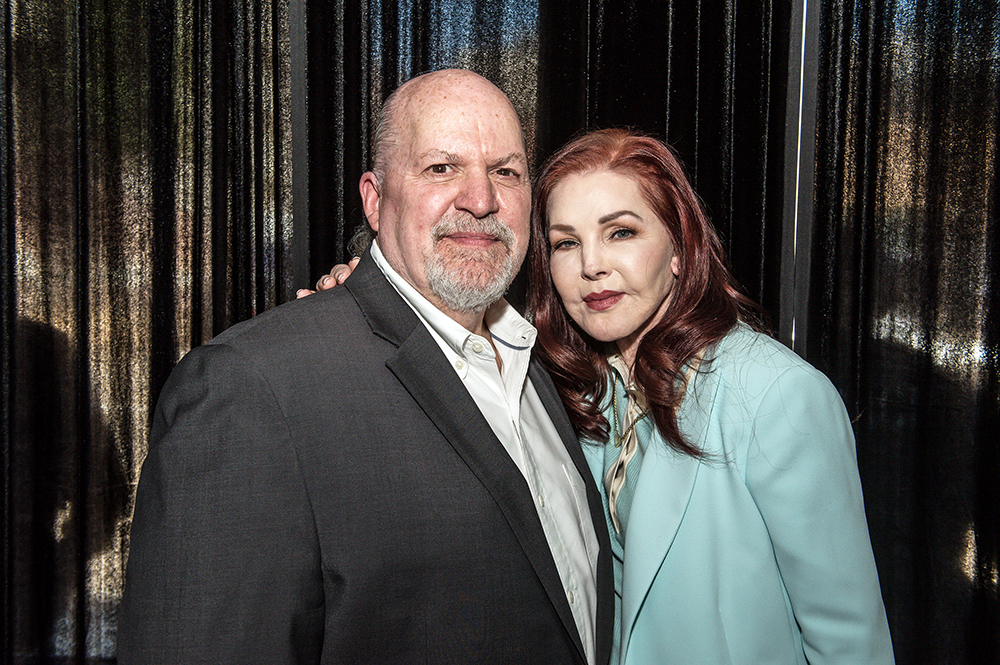
John Doyle and Priscilla Presley (Photo: Courtesy Memphis Rock ‘n’ Soul Museum)
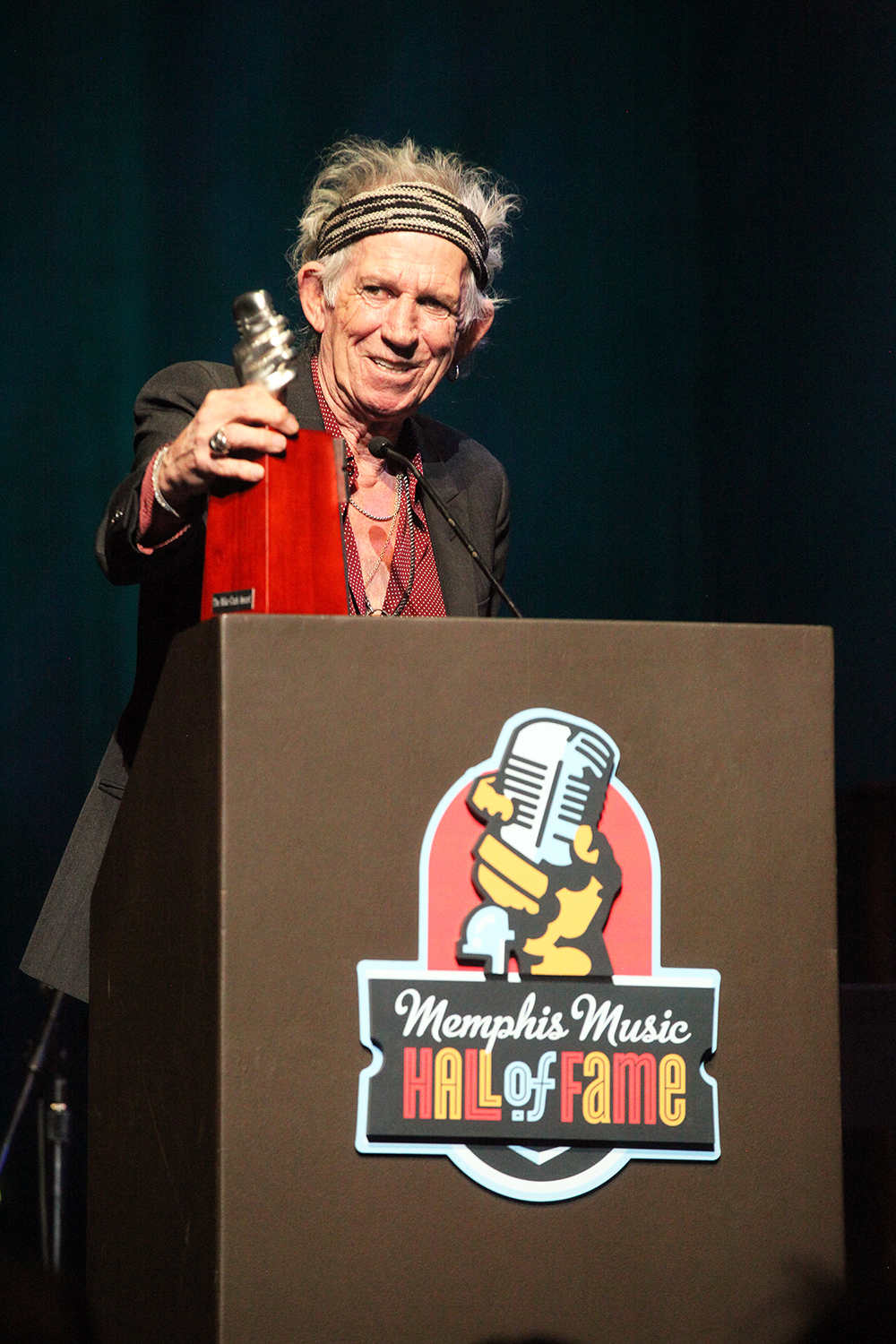
Keith Richards at 2015 MMHOF Induction Ceremony (Photo: Courtesy Memphis Rock ‘n’ Soul Museum)
Sacred Ground
Although Rock ‘n’ Soul won’t move for another year or two, the upcoming location is already spurring on a new groundswell of support for the museum. As it turns out, there’s nothing like having a Beale Street address. “Priscilla Presley is very engaged about what we’re doing,” says Doyle. “She’s obviously engaged because Elvis was tied to that building. But she also considers Memphis home, despite the fact that she lives in Los Angeles — as she’s said, she lived at Graceland longer than she lived anywhere in her life, being a military brat. And so she’s gone with me twice to the State Capitol to talk to legislators and the governor about how important this is, not just for the Rock ‘n’ Soul Museum, but for Memphis music and for the future of Beale Street, the safety of Beale Street: to have daytime and family-friendly programming, to enhance what the clubs and restaurants are doing. We’re looking forward to working with the Beale Street merchants, to be a good partner there, even though we’re on the other side of Second Street from the Beale Street Historic District.”
Mike Curb, for his part, also sees the move as potentially creating a critical mass around Beale Street. “We’re kind of hoping to do on Beale Street what we did in Nashville’s Music Row, where we bought quite a few buildings. … We’re going to do something really special.”
A whole new world of possibilities is opening up, in part because of a significant increase in square footage, but also because of what the Hard Rock Cafe left in its wake. “Fortunately, when Hard Rock Cafe left town,” says Doyle, “they left every plate, every fork and spoon, the most incredible kitchen equipment you’ve ever seen, and a stage with full sound equipment, full lights. Everything was left for us. I guess it was a housewarming gift. And we have great space in the building, double the space that we currently have for our two museums’ exhibits, so we could make room for a performance space, a larger gift shop, a recording studio to help students with podcasts, and host Beale Street Caravan, that sort of thing. We can have summer camps for kids, music performances, private facility rentals, anything that you want in that space, and still keep the museums running. This building is going to afford that.”
Naturally, putting the museums at the head of the entertainment district will make them both more visible, and, together under one roof, able to attract more visitors. Most of all, they will be both on and of Beale, the old carriage shop’s brick walls, where a saloon’s rowdy crowd once fought, courted, and raised toasts, exuding the street’s spirit. Within those walls, Rock ‘n’ Soul and MMHOF will embody the very history they celebrate. As Doyle puts it, “Those are the things that make us sacred. We are moving into sacred ground.”
